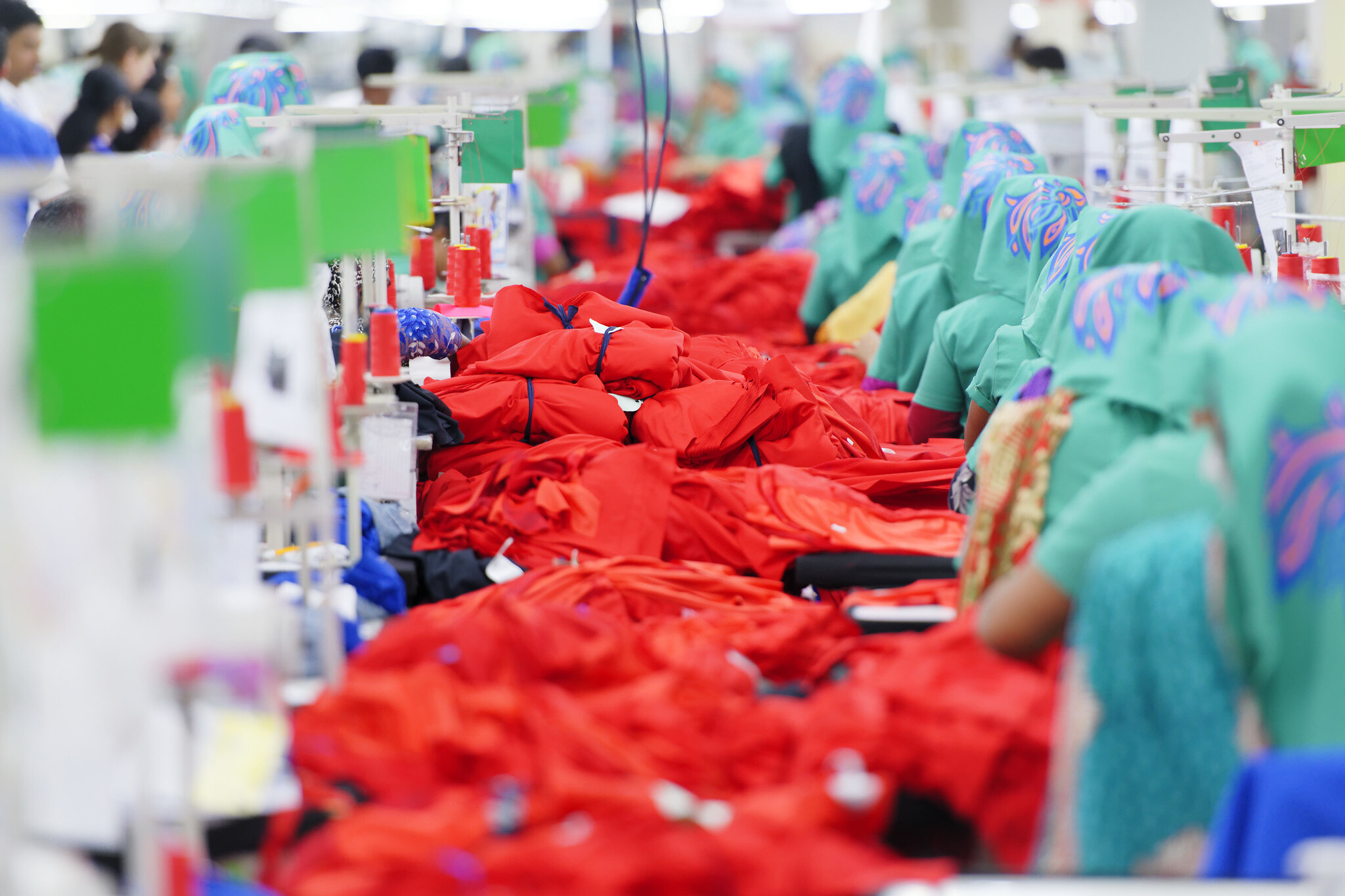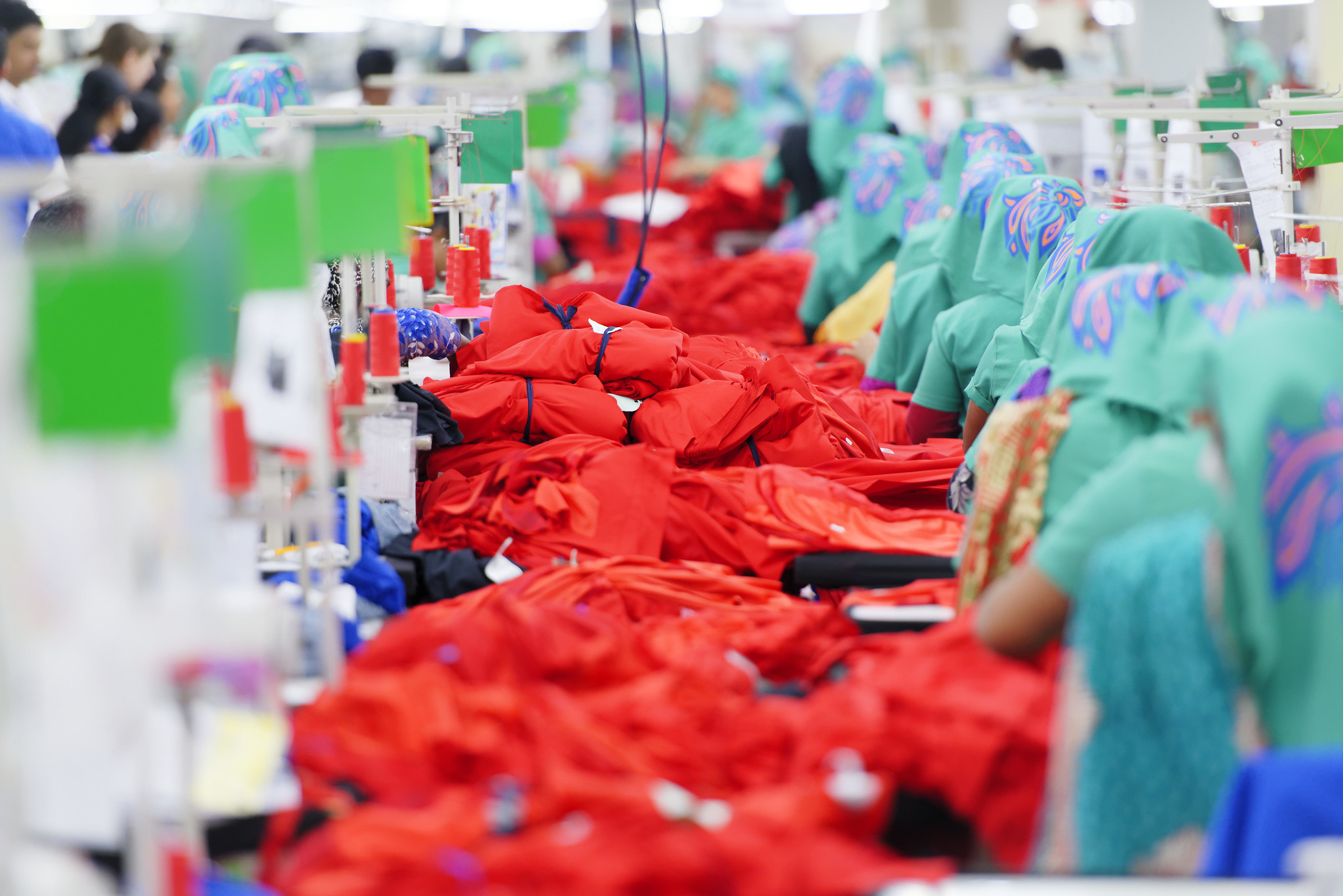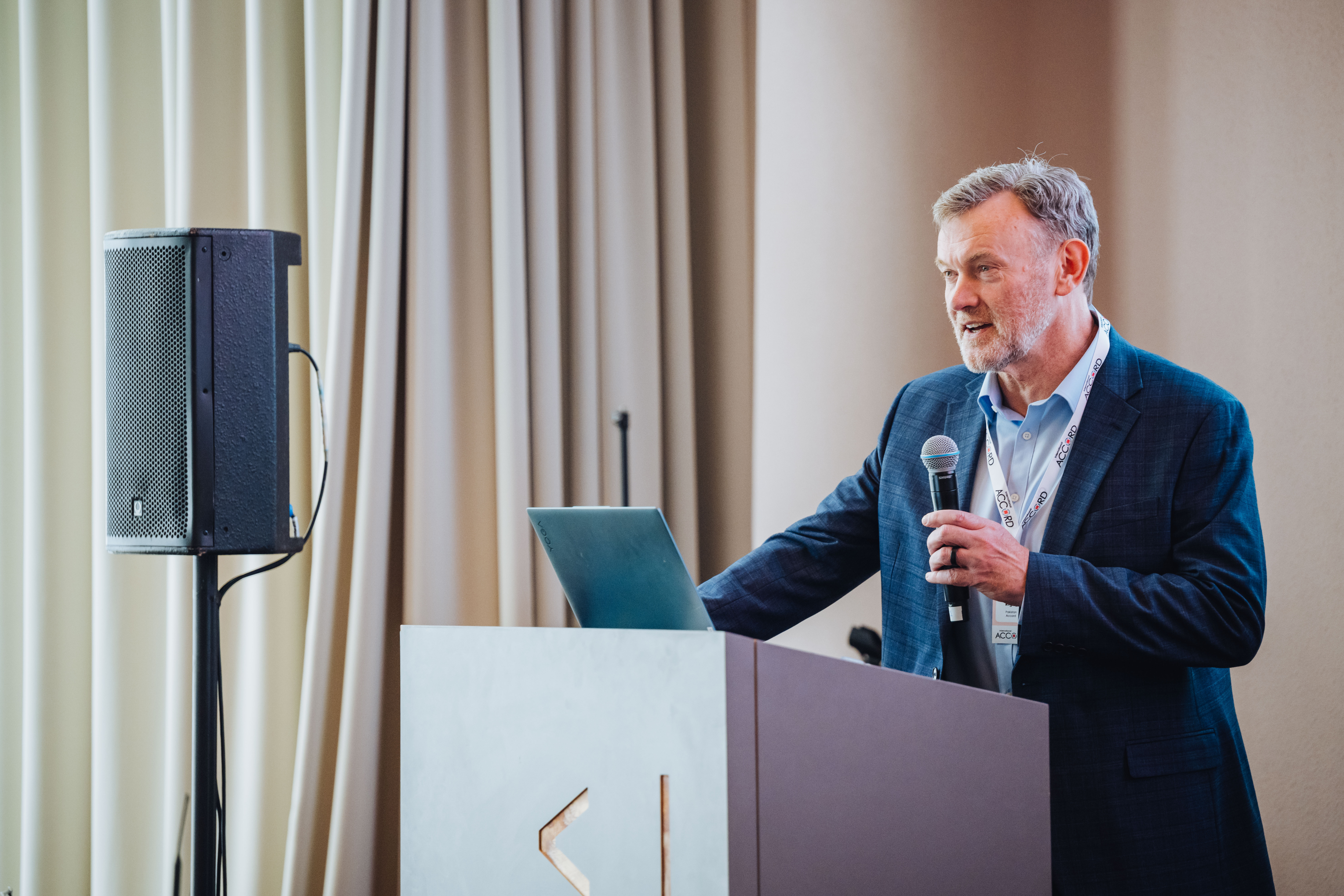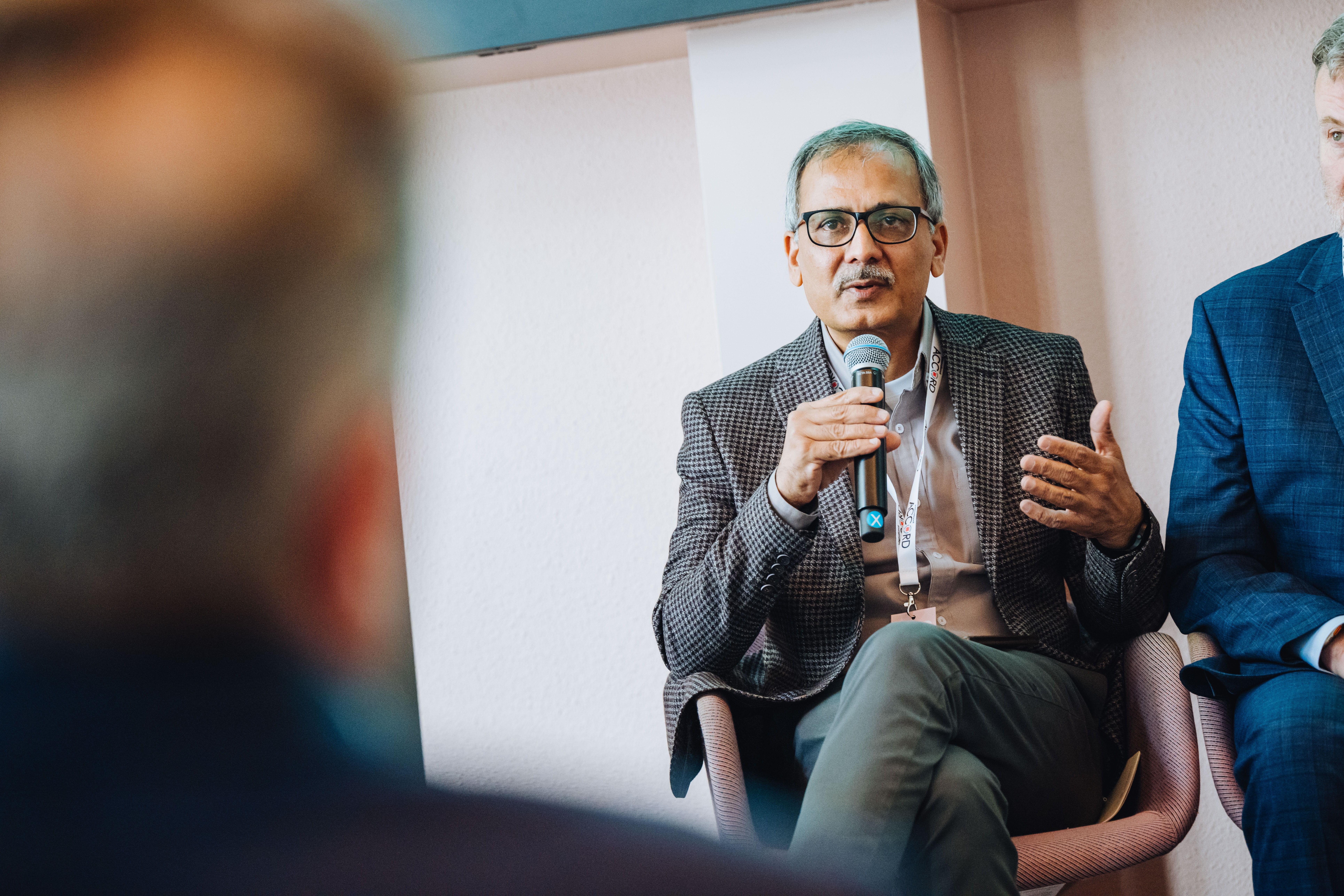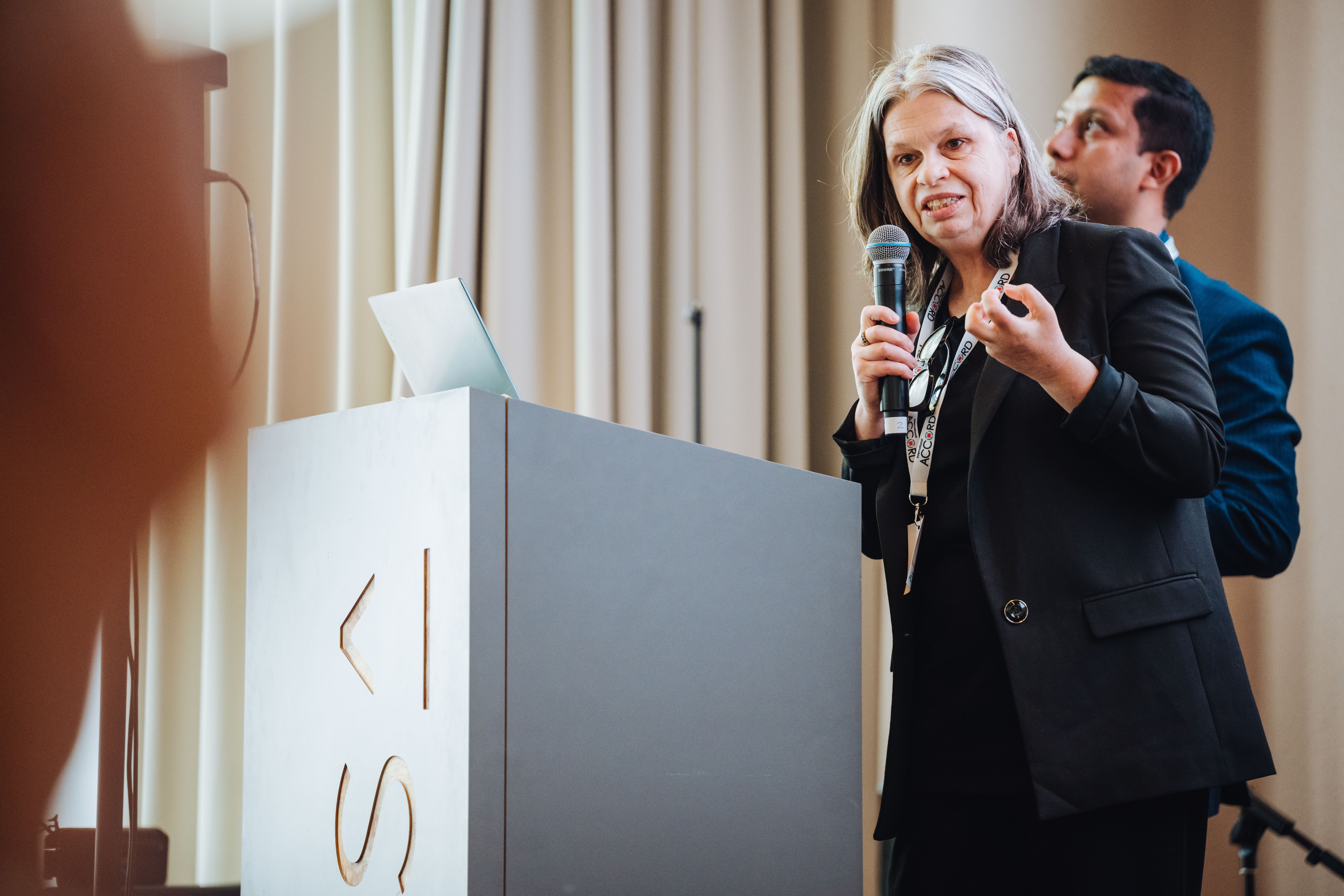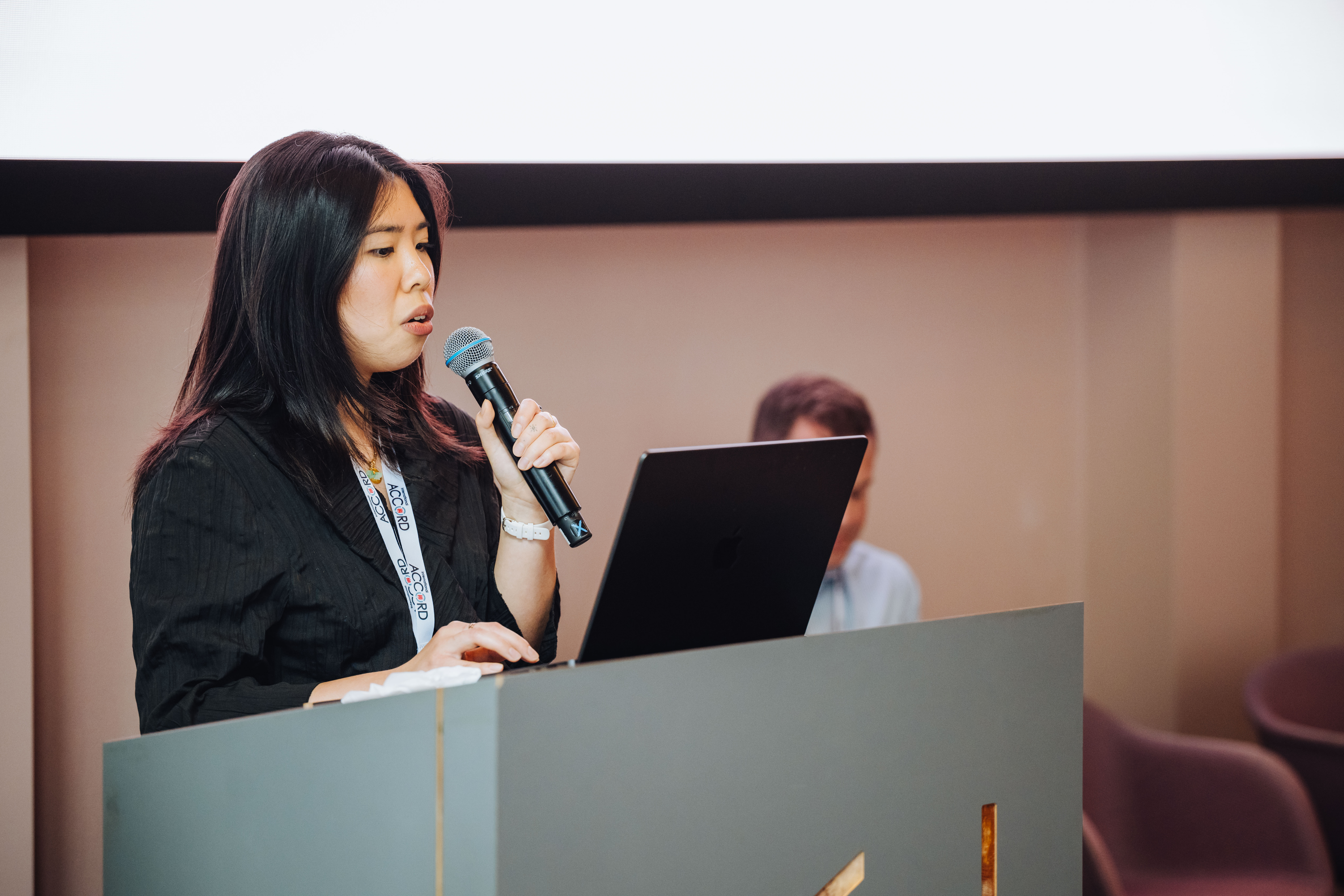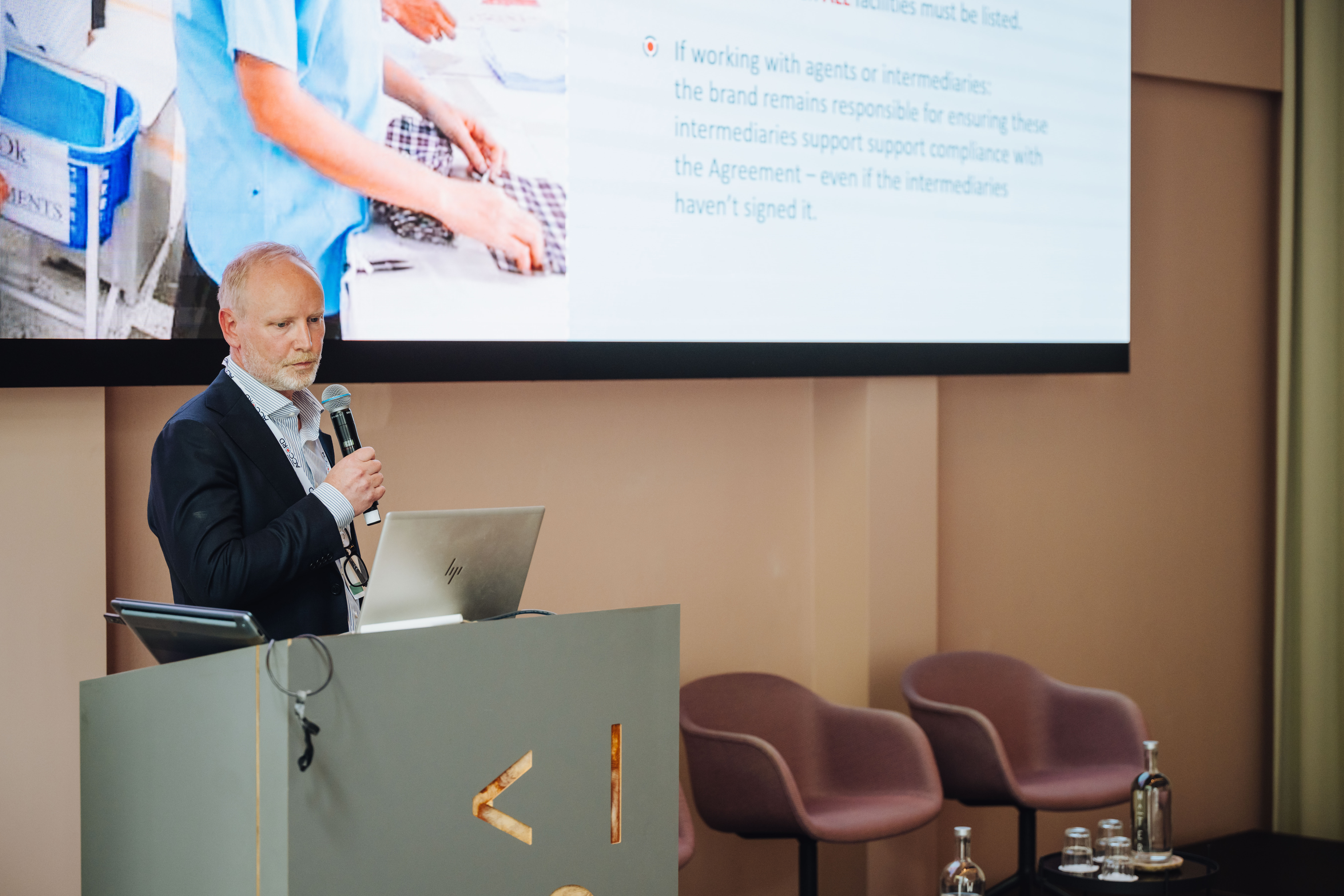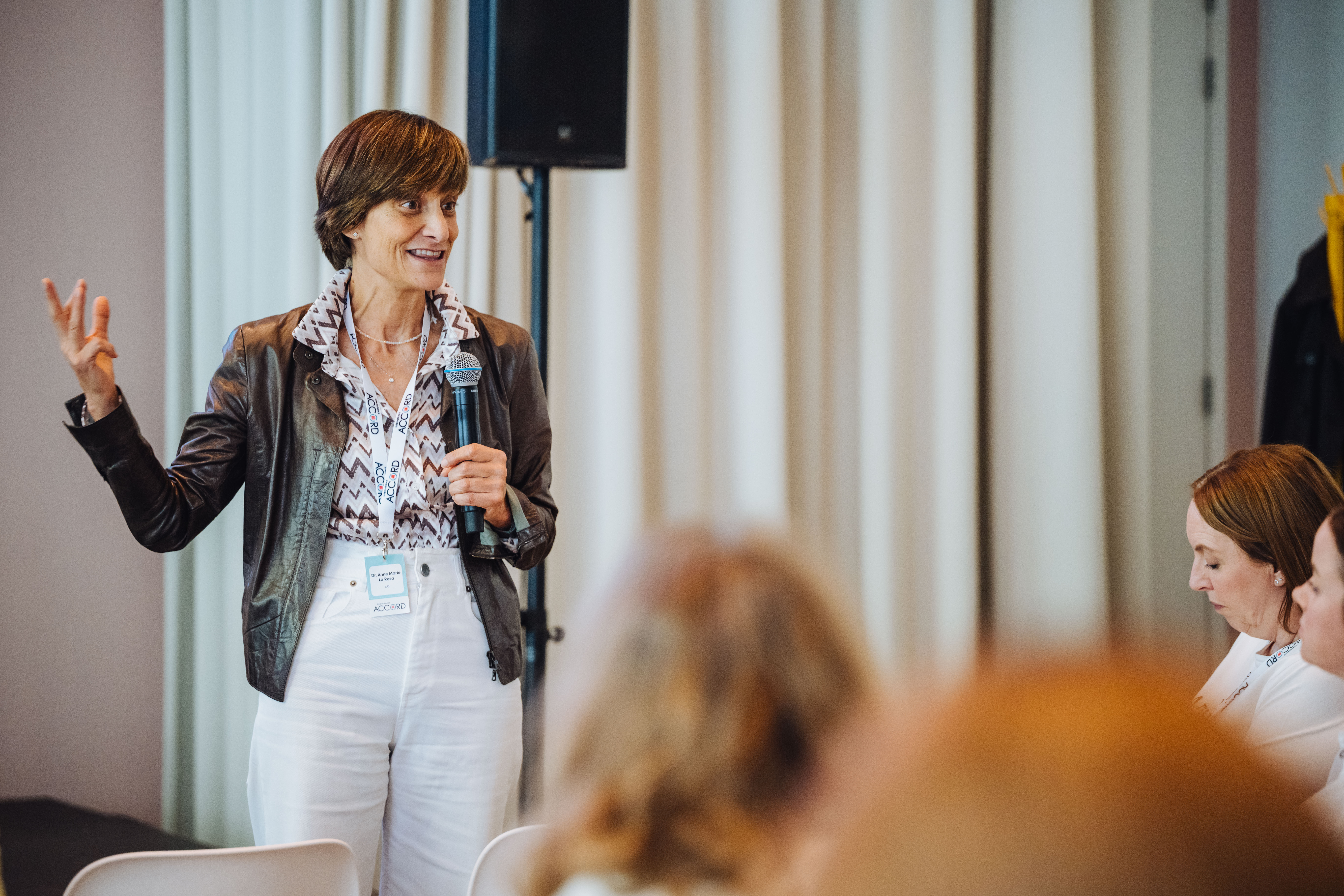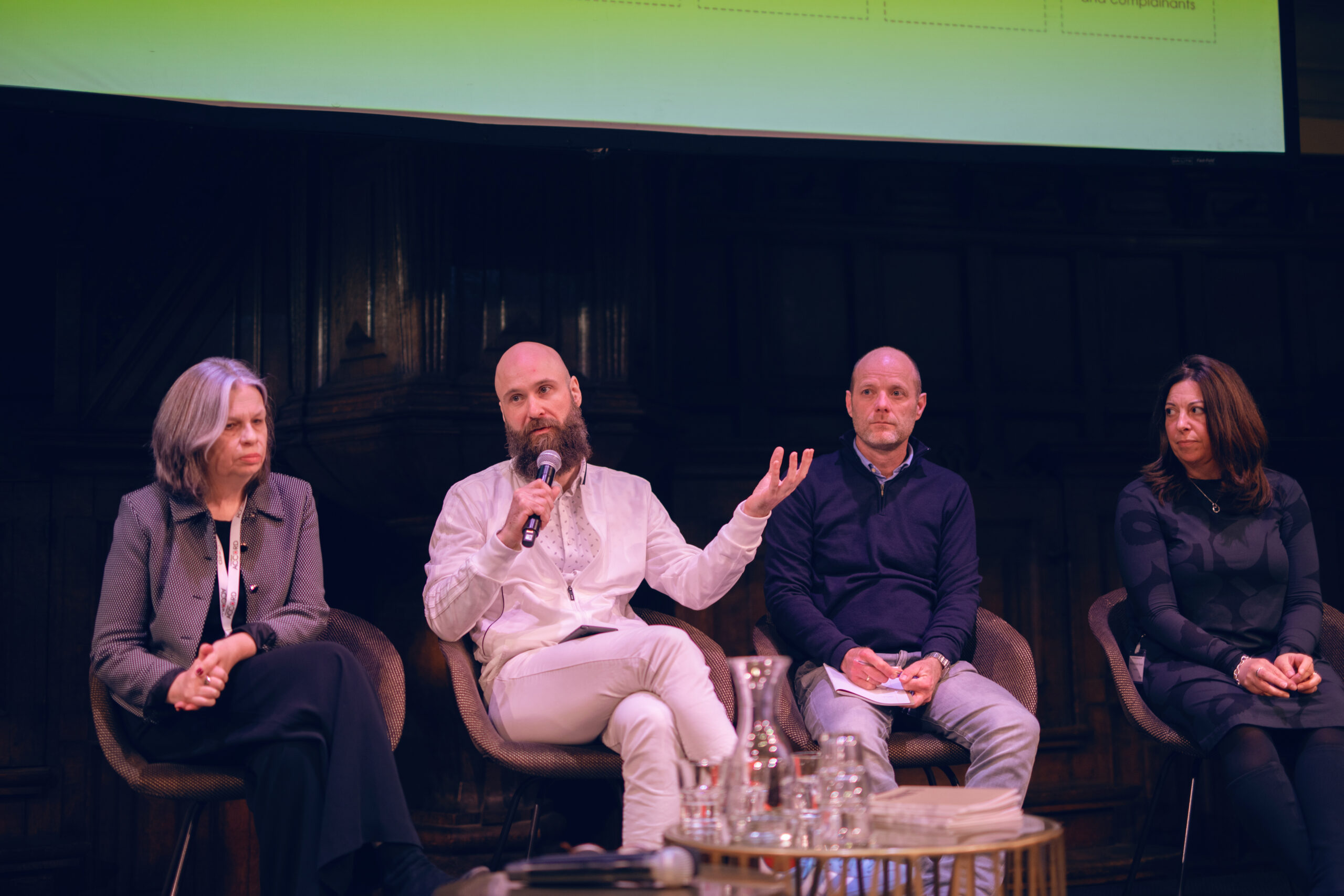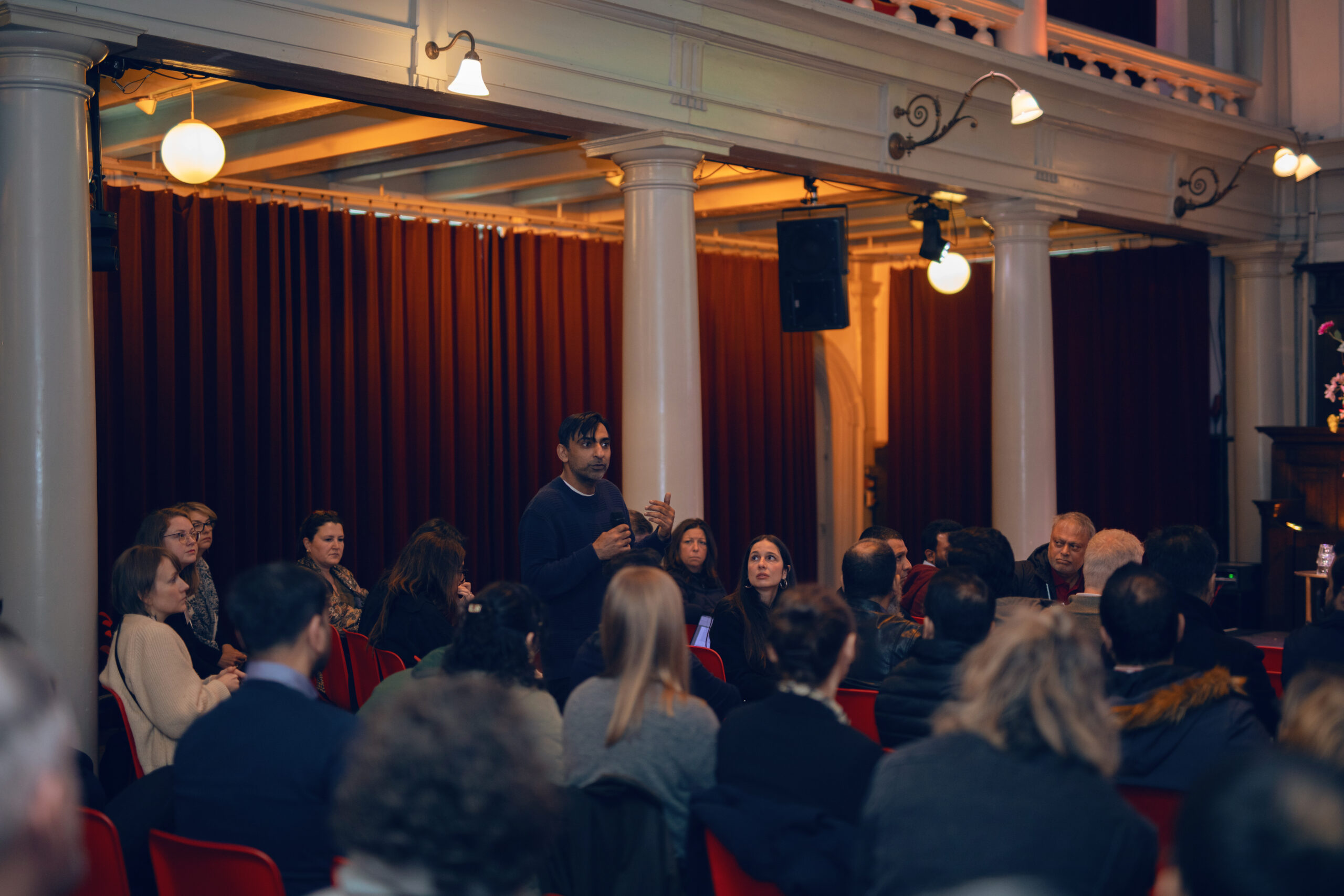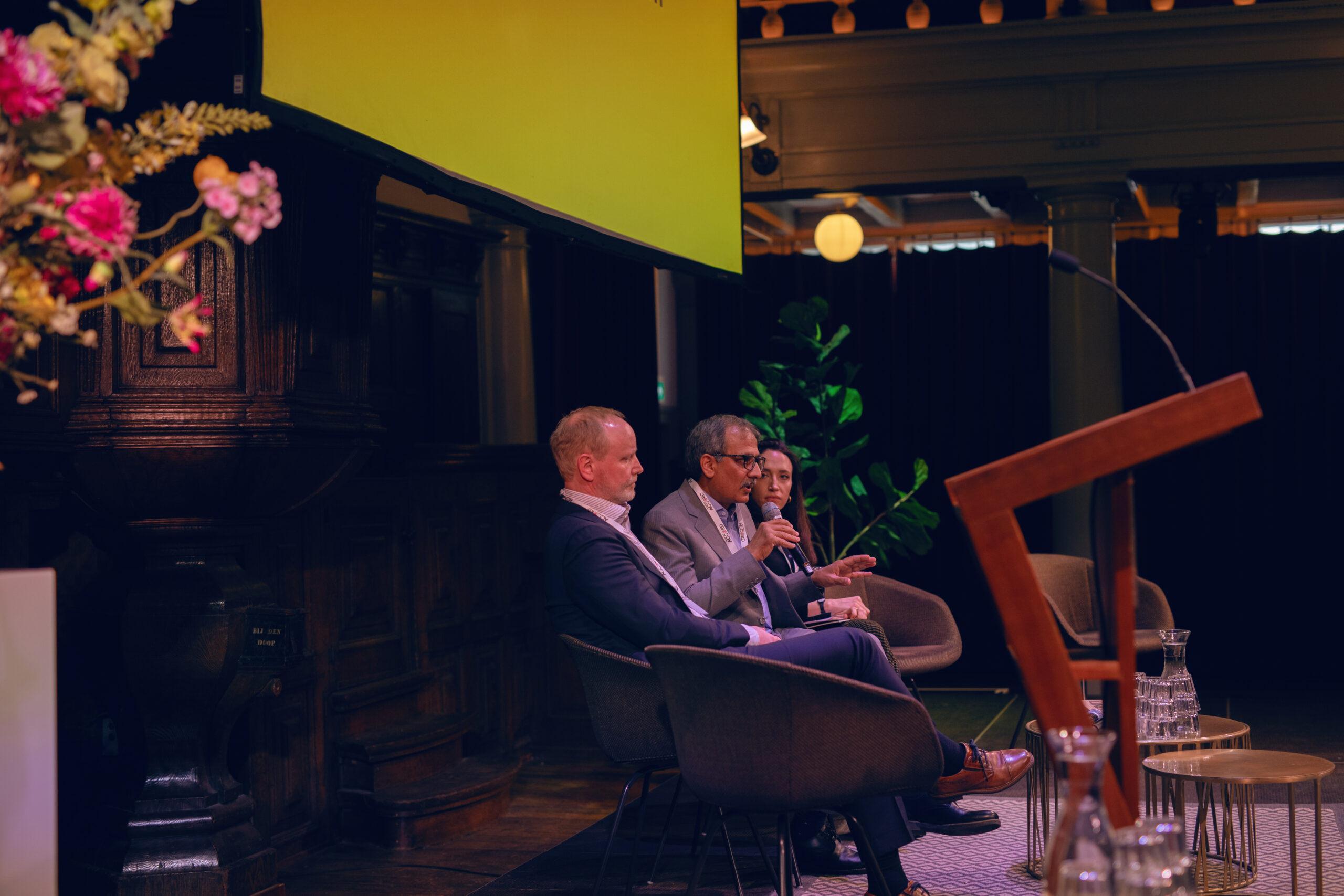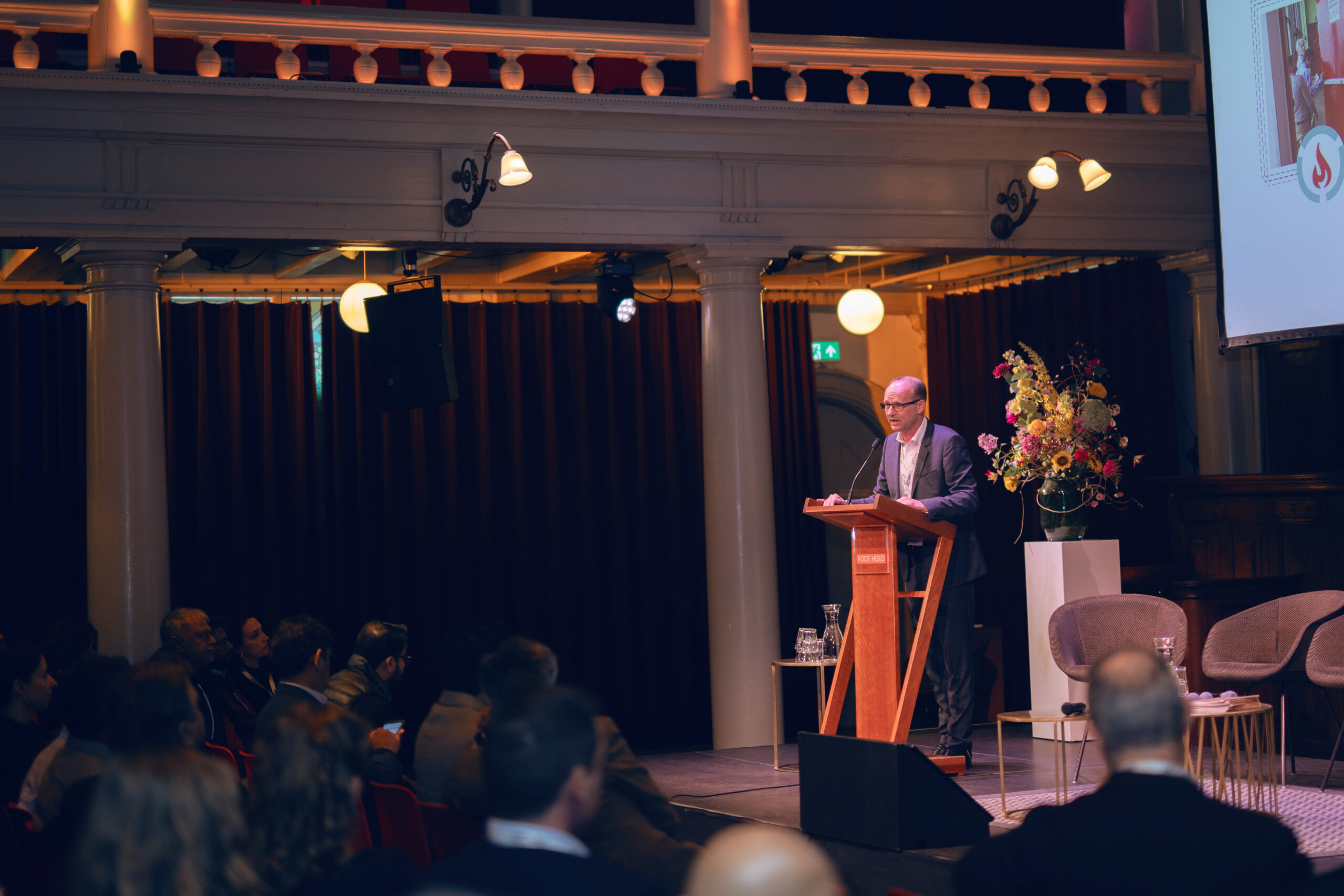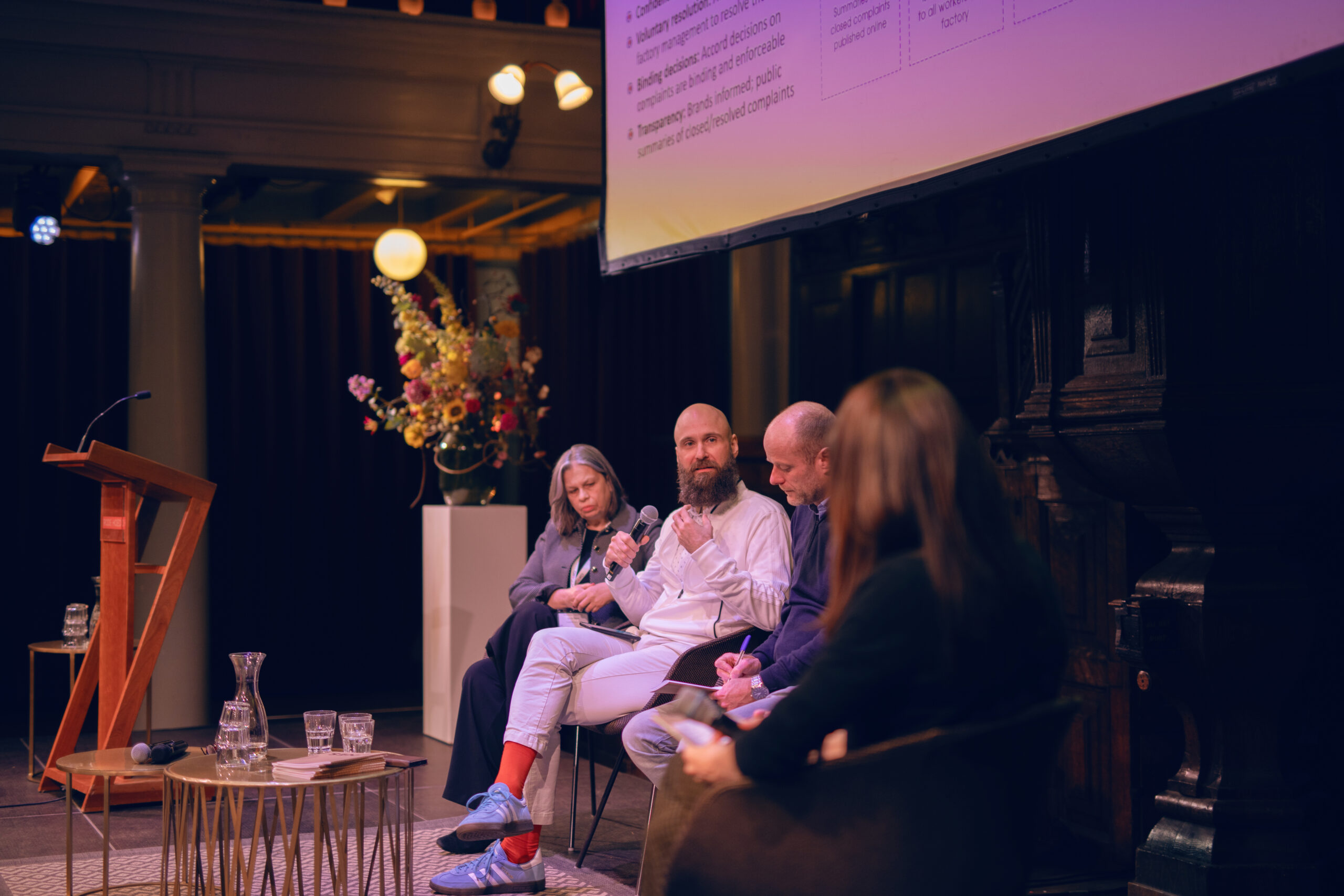Factory Inspections to Assess Structural Damage from Bangladesh Earthquake
Updates
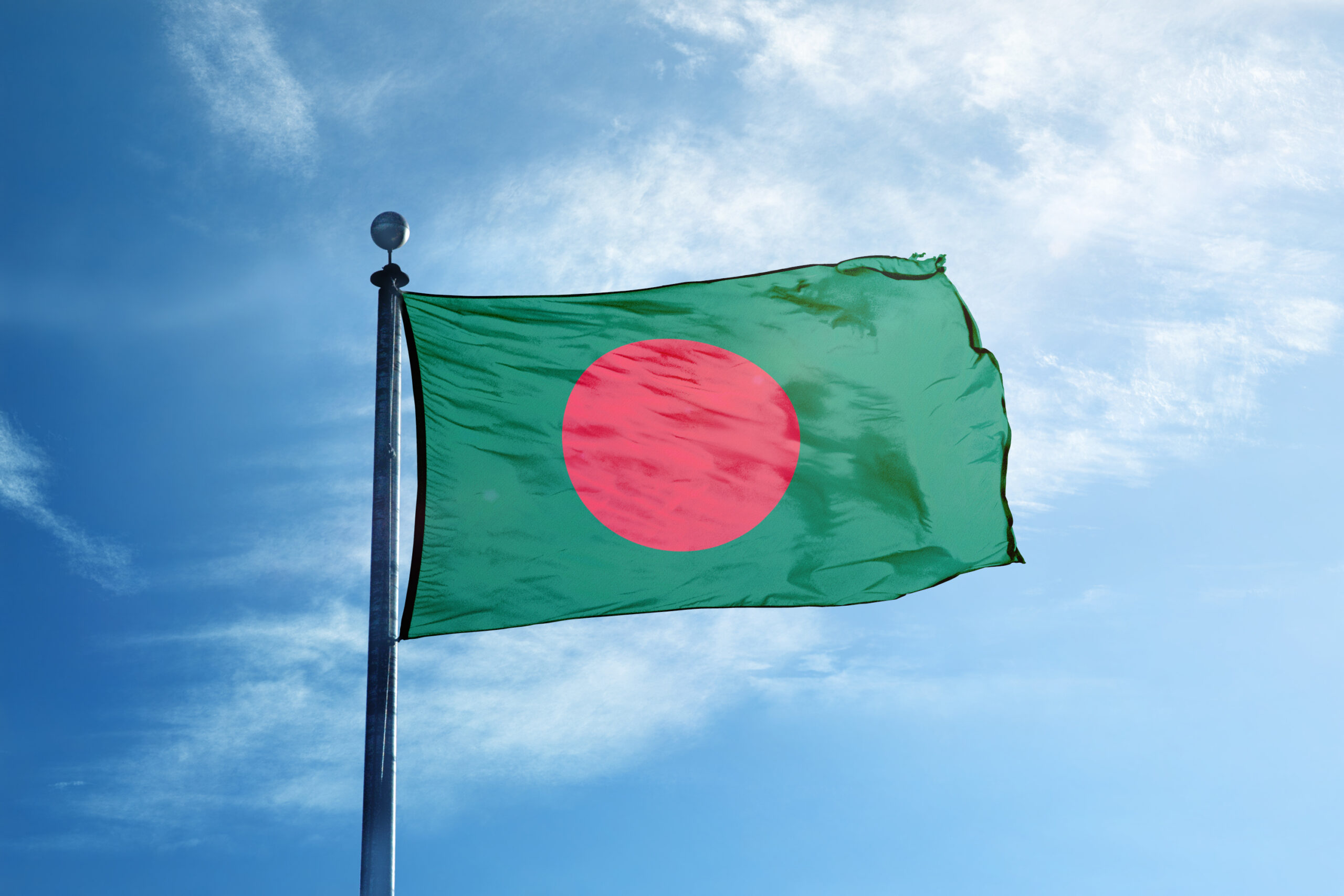
The International Accord is saddened by the earthquake in Bangladesh and concerned about the reported injuries and loss of life. Our thoughts are with all affected individuals and families.
Our engineering colleagues from the RMG Sustainability Council (RSC) are conducting post-incident inspections at Accord and RSC covered factories where cracks, structural damage, or injuries have been reported and will support the necessary remediation efforts. Ensuring workplace safety remains our highest priority.
We reaffirm every worker’s right to refuse unsafe work and will continue supporting signatory brands in fulfilling their commitments to uphold it. We are closely monitoring the situation and conducting detailed assessments to implement effective safety measures as the situation evolves.
For more information, contact:
Related updates
October 16, 2025
Safe exits, unlocked gates, functioning alarms, effective fire separation, and strong emergency preparedness are essential for the health and safety of every worker, within and beyond the garment industry.
August 11, 2025
This briefing provides updates on the number of signatory brands and covered factories, the rollout of Workplace Programs, and recent events organised by the Pakistan Accord team.
May 28, 2025
The International Accord’s All Signatory Meeting was dedicated to insights on the progress and operations of the Accord’s country program in Bangladesh and Pakistan, alongside exploring opportunities to expand the Accord’s scope and impact.
October 16, 2025
Safe exits, unlocked gates, functioning alarms, effective fire separation, and strong emergency preparedness are essential for the health and safety of every worker, within and beyond the garment industry.
May 28, 2025
The International Accord’s All Signatory Meeting was dedicated to insights on the progress and operations of the Accord’s country program in Bangladesh and Pakistan, alongside exploring opportunities to expand the Accord’s scope and impact.
February 19, 2025
The Pakistan Accord team recently organised a series of capacity building workshops for government officials in the Sindh and Punjab provinces.
Statement: Expansion of the Worker Complaints Mechanism in Bangladesh
Updates
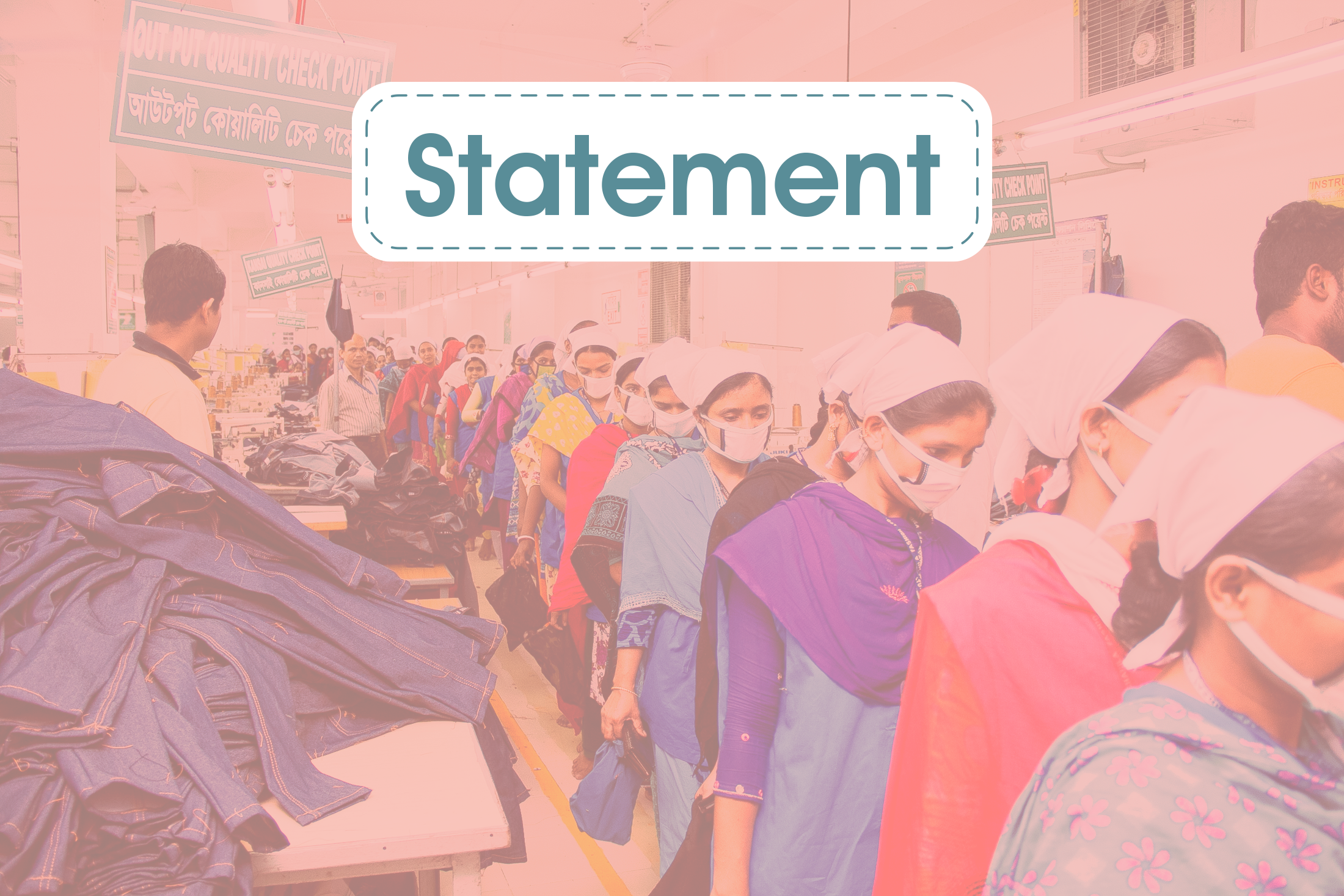
Statement
Amsterdam, 9 November 2025:
The International Accord is pleased to announce that, from mid-November 2025, the Worker Complaints Mechanism in Bangladesh will be expanded to cover issues beyond Occupational Safety and Health (OSH).
Originally established under the 2013 Accord on Fire and Building Safety in Bangladesh, the Complaints Mechanism has been implemented by the Ready-Made Garment (RMG) Sustainability Council (RSC) since June 2020. It is implemented in accordance with the principles enshrined in the International Accord Framework Agreement and its country program, the Bangladesh Safety Agreement.
The Complaints Mechanism has become a trusted and effective channel for workers to raise safety and health concerns confidentially or anonymously. Over 4,000 OSH complaints have been filed to date, reflecting the strong trust workers and their representatives place in it.
Workers have raised various safety and health issues in their complaints including denial of maternity benefits, workplace violence and harassment, denial of sick leave, forced overtime, work-related injuries and fatalities. The Complaints Mechanism has provided a range of remedy including reinstatement, maternity payments and leave, disciplinary action, training, sick leave, measures to help prevent forced overtime and compensation payments for occupational injuries and deaths.
While the Complaints Mechanism has successfully delivered remedy for complaints related to safety and health, Accord signatories and stakeholders recognise that many complaints concern other work-related matters that could not be processed under the existing Complaints Mechanism. They have therefore agreed on the value of a unified Complaints Mechanism that addresses all workplace-related complaints and operates in line with the UN Guiding Principles on Business and Human Rights’ criteria for effective non-judicial grievance mechanisms.
In addition to OSH issues, the expanded Complaints Mechanism will cover the ILO Fundamental Principles and Rights at Work, as well as the most common types of complaints including wage payments, overtime, inequitable employment contracts, and severance benefits.
“The expanded scope of the Complaints Mechanism allows the RSC to address a wider range of workers’ concerns on behalf of Accord signatories. We are encouraged by the trust that workers, factories, signatories, and other stakeholders have placed in the Complaints Mechanism over the years and remain committed, alongside our RSC colleagues, to continue to operate with independence, impartiality, integrity and respect for confidentiality,” said Joris Oldenziel, Executive Director, International Accord.
Implementation will be carried out in phases, starting with over 50 signatory brands and 1,000 factories, to ensure a smooth and effective rollout, and subsequently extended to include all covered factories from May 2026. The International Accord, together with the RSC team, signatory brands, and trade unions, will continue to ensure that the Complaints Mechanism remains an accessible and trusted complaints channel for workers.
We extend our appreciation to the RSC Complaints Team for their tireless dedication in operating the Complaints Mechanism, investigating complaints, and delivering timely remedy to workers across covered factories.
We are also grateful to all parties involved, including Accord signatories, trade unions, industry partners, and civil society organisations, for their ongoing collaboration and commitment, which helps to ensure that the Complaints Mechanism continues to operate independently and effectively.
END
Resources
For more information, contact:
Related updates
October 16, 2025
Safe exits, unlocked gates, functioning alarms, effective fire separation, and strong emergency preparedness are essential for the health and safety of every worker, within and beyond the garment industry.
August 11, 2025
This briefing provides updates on the number of signatory brands and covered factories, the rollout of Workplace Programs, and recent events organised by the Pakistan Accord team.
May 28, 2025
The International Accord’s All Signatory Meeting was dedicated to insights on the progress and operations of the Accord’s country program in Bangladesh and Pakistan, alongside exploring opportunities to expand the Accord’s scope and impact.
October 16, 2025
Safe exits, unlocked gates, functioning alarms, effective fire separation, and strong emergency preparedness are essential for the health and safety of every worker, within and beyond the garment industry.
May 28, 2025
The International Accord’s All Signatory Meeting was dedicated to insights on the progress and operations of the Accord’s country program in Bangladesh and Pakistan, alongside exploring opportunities to expand the Accord’s scope and impact.
February 19, 2025
The Pakistan Accord team recently organised a series of capacity building workshops for government officials in the Sindh and Punjab provinces.
Pakistan Accord Brand-Supplier Roundtable Highlights Progress and Collaboration
Updates
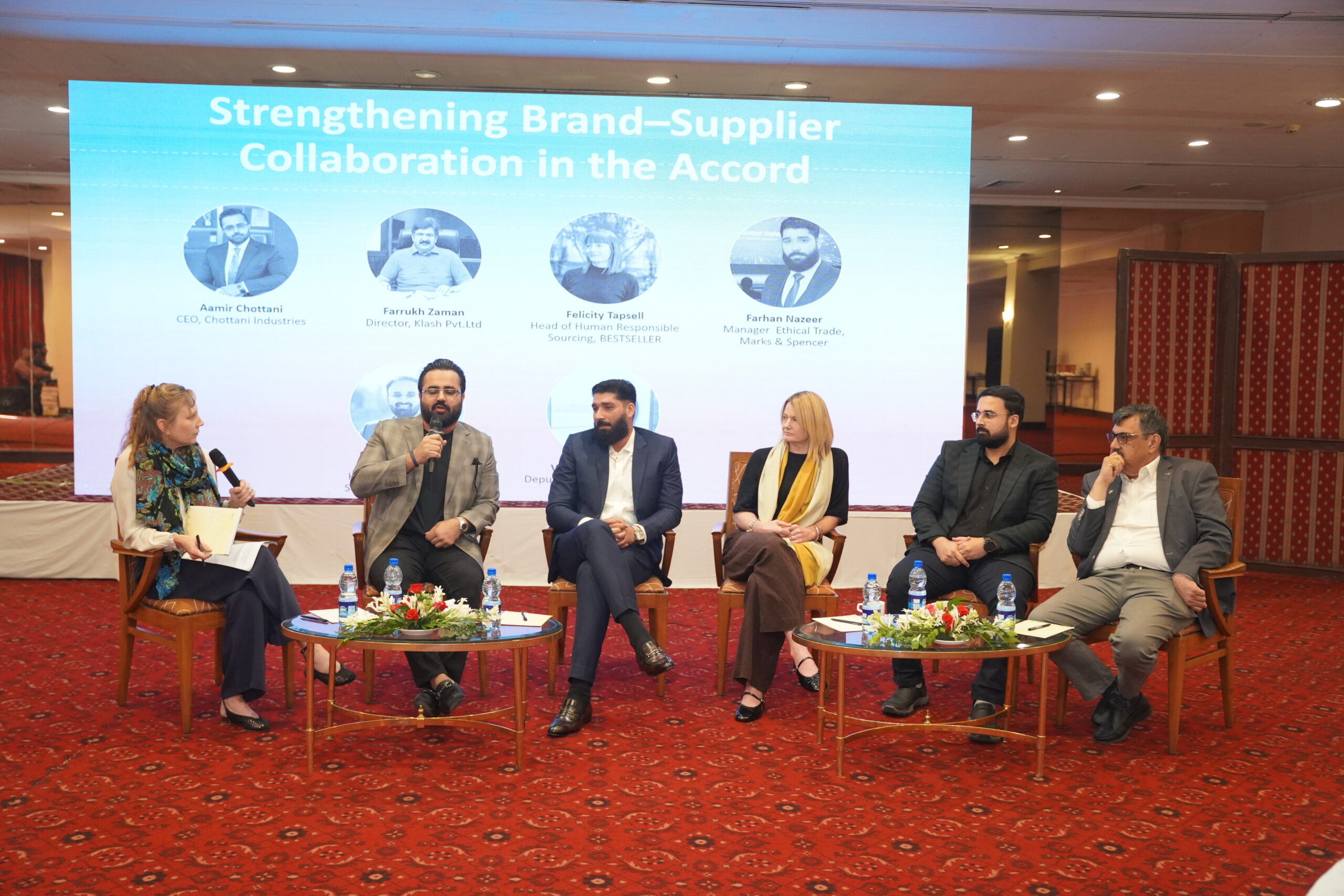
On 23 October 2025, the Pakistan Accord hosted a Brand-Supplier Roundtable at the Avari Hotel in Lahore, bringing together over 50 brand representatives and 30 key suppliers. The event provided a platform for open dialogue on strengthening cooperation, sharing learnings, and identifying opportunities to enhance occupational safety and health across Pakistan’s textile and garment sector.
In his opening remarks, Michael Bride, Senior VP Corporate Responsibility, Global Affairs at PVH Corp, highlighted brand commitment to Pakistan:
“With over 140 brands now part of the Pakistan Accord, our message to our supplying partners is clear: we believe in Pakistan’s potential and remain committed to investing in the country’s textile and garment industry.”
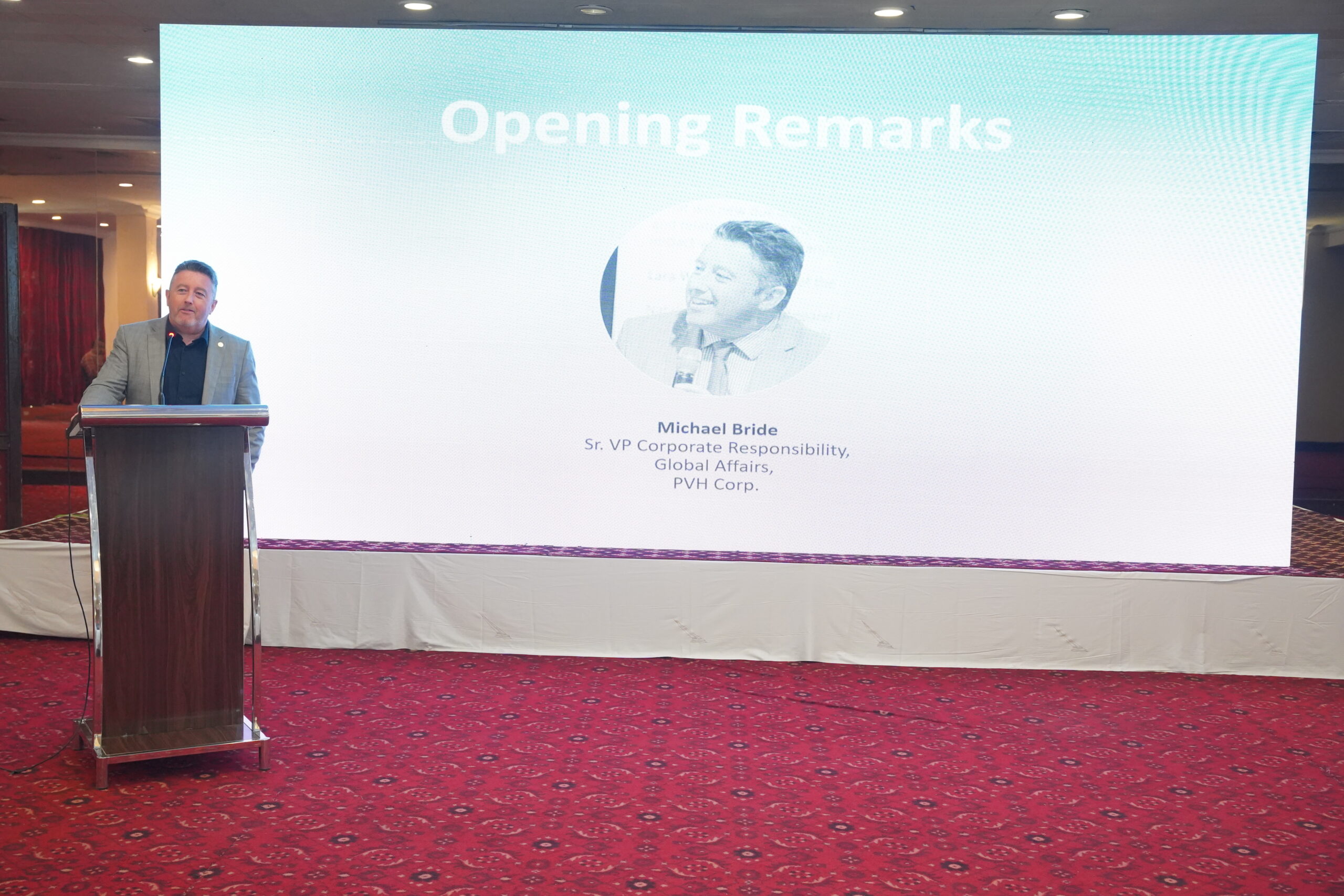
Brands reaffirmed their trust in the Pakistan Accord to ensure lifesaving safety measures and transparency in monitoring risks — key contributing factors to sustaining and expanding sourcing from Pakistan.
Farhan Nazeer, Manager, Ethical Trade at Marks & Spencer, noted that the presence of the Pakistan Accord has contributed to exploring increased sourcing in the country.
Suppliers echoed this sentiment. Aamir Chottani, CEO of Chottani Industries and Chairman of the Pakistan Readymade Garment Manufacturers and Exporters Association (PRGMEA) South Zone, stated:
“The Accord is a door opener for business to suppliers; it builds confidence for the top management of brands that inspections are conducted independently and transparently.”
A dedicated panel explored how to further strengthen brand-supplier collaboration, featuring:
- Felicity Tapsell, BESTSELLER
- Farhan Nazeer, Marks & Spencer
- Aamir Chottani, Chottani Industries
- Raffay Bin Rauf, Sapphire Finishing Mills
- Farrukh Zaman, Klash Pvt. Ltd
Suppliers commended the Pakistan Accord Secretariat’s work while underscoring the need for greater technical engineering capacity and a clearer return on investment for safety measures. They also called for sustained brand support through stable, long-term business relationships.
Raffay Bin Rauf of Sapphire Finishing Mills emphasised:
“Brands should consider factories as business partners, not just suppliers.”
The Accord extends its gratitude for International Accord Steering Committee members Felicity Tapsell (BESTSELLER) and Michael Bride (PVH), who reaffirmed their commitment to extend the Pakistan Accord into 2026, working together to ensure a safe and sustainable garment and textile industry in Pakistan.
The Roundtable was followed by an internal brand meeting focused on operations and collective efforts to ensure the successful and continued rollout of the Pakistan Accord.
For more information, contact:
- media@internationalaccord.org
- Mini Dixit, Communications Advisor: mini.dixit@internationalaccord.org
Related updates
October 16, 2025
Safe exits, unlocked gates, functioning alarms, effective fire separation, and strong emergency preparedness are essential for the health and safety of every worker, within and beyond the garment industry.
August 11, 2025
This briefing provides updates on the number of signatory brands and covered factories, the rollout of Workplace Programs, and recent events organised by the Pakistan Accord team.
May 28, 2025
The International Accord’s All Signatory Meeting was dedicated to insights on the progress and operations of the Accord’s country program in Bangladesh and Pakistan, alongside exploring opportunities to expand the Accord’s scope and impact.
October 16, 2025
Safe exits, unlocked gates, functioning alarms, effective fire separation, and strong emergency preparedness are essential for the health and safety of every worker, within and beyond the garment industry.
May 28, 2025
The International Accord’s All Signatory Meeting was dedicated to insights on the progress and operations of the Accord’s country program in Bangladesh and Pakistan, alongside exploring opportunities to expand the Accord’s scope and impact.
February 19, 2025
The Pakistan Accord team recently organised a series of capacity building workshops for government officials in the Sindh and Punjab provinces.
Accord Offers Condolences to the Victims of the Mirpur Factory Fire
Updates
The International Accord is deeply saddened by the tragic fire at a garment factory and chemical warehouse in the Shialbari area of Mirpur, Dhaka, which has claimed at least 16 lives and injured many others. Our heartfelt condolences go out to the victims, their families, and all those affected.
This tragedy is a stark reminder of the devastating human cost of inadequate safety measures. Safe exits, unlocked gates, functioning alarms, effective fire separation, and strong emergency preparedness are essential for the safety of every worker, within and beyond the garment industry.
To our knowledge, the affected establishments are not listed by company signatories of the Bangladesh Safety Agreement and not covered by the inspections and remediation program implemented by the RMG Sustainability Council (RSC) in Bangladesh. Nonetheless, this incident underscores the urgent need for comprehensive health and safety measures across all industries.
For over a decade, the collective efforts of brands, trade unions, factories, and civil society partners under the Accord have contributed to workplace health and safety improvements at covered garment and textile factories in Bangladesh. While this includes over 2000 factories employing 2.5 million workers, it represents only part of the Bangladesh’s RMG sector.
Ensuring that every worker has access to a safe working environment must remain a shared priority and responsibility. The Accord and the RSC reaffirm their dedication to working with global brands, industry partners, worker representatives and government authorities to build and maintain a culture of health and safety that prevents such tragedies within the RMG sector in Bangladesh.
The Accord will, together with our colleagues from the RSC, continue to monitor the situation at the affected area and any potential impact on surrounding factories.
END
For more information, contact:
- media@internationalaccord.org
- Mini Dixit, Communications Advisor: mini.dixit@internationalaccord.org
Related updates
October 16, 2025
Safe exits, unlocked gates, functioning alarms, effective fire separation, and strong emergency preparedness are essential for the health and safety of every worker, within and beyond the garment industry.
August 11, 2025
This briefing provides updates on the number of signatory brands and covered factories, the rollout of Workplace Programs, and recent events organised by the Pakistan Accord team.
May 28, 2025
The International Accord’s All Signatory Meeting was dedicated to insights on the progress and operations of the Accord’s country program in Bangladesh and Pakistan, alongside exploring opportunities to expand the Accord’s scope and impact.
October 16, 2025
Safe exits, unlocked gates, functioning alarms, effective fire separation, and strong emergency preparedness are essential for the health and safety of every worker, within and beyond the garment industry.
May 28, 2025
The International Accord’s All Signatory Meeting was dedicated to insights on the progress and operations of the Accord’s country program in Bangladesh and Pakistan, alongside exploring opportunities to expand the Accord’s scope and impact.
February 19, 2025
The Pakistan Accord team recently organised a series of capacity building workshops for government officials in the Sindh and Punjab provinces.
Recap: Accord All Signatory Meeting 2025
Updates

The International Accord held its 2025 All Signatory Meeting on 21 May at Hotel Casa in Amsterdam, the Netherlands. The meeting offered valuable insights into the progress and operations of the Accord’s Country-Specific Safety Programs (CSSPs) in Bangladesh and Pakistan, while exploring future opportunities for expanding the Accord’s scope and impact.
The event brought together over 120 participants from key stakeholder groups, including brand, trade union, and NGO signatories. It also welcomed colleagues from the RMG Sustainability Council (RSC) and the Pakistan Accord Secretariat.
The day commenced with opening remarks from Joris Oldenziel, Executive Director of the International Accord. He welcomed attendees and reflected on the broader socio-political and legislative developments affecting the global textile and garment industry.
Oldenziel noted that, despite ongoing global challenges, the Accord continues to gain momentum. He highlighted that the International Accord and its Bangladesh country program have reached a historic milestone—achieving the highest number of signatories to date.
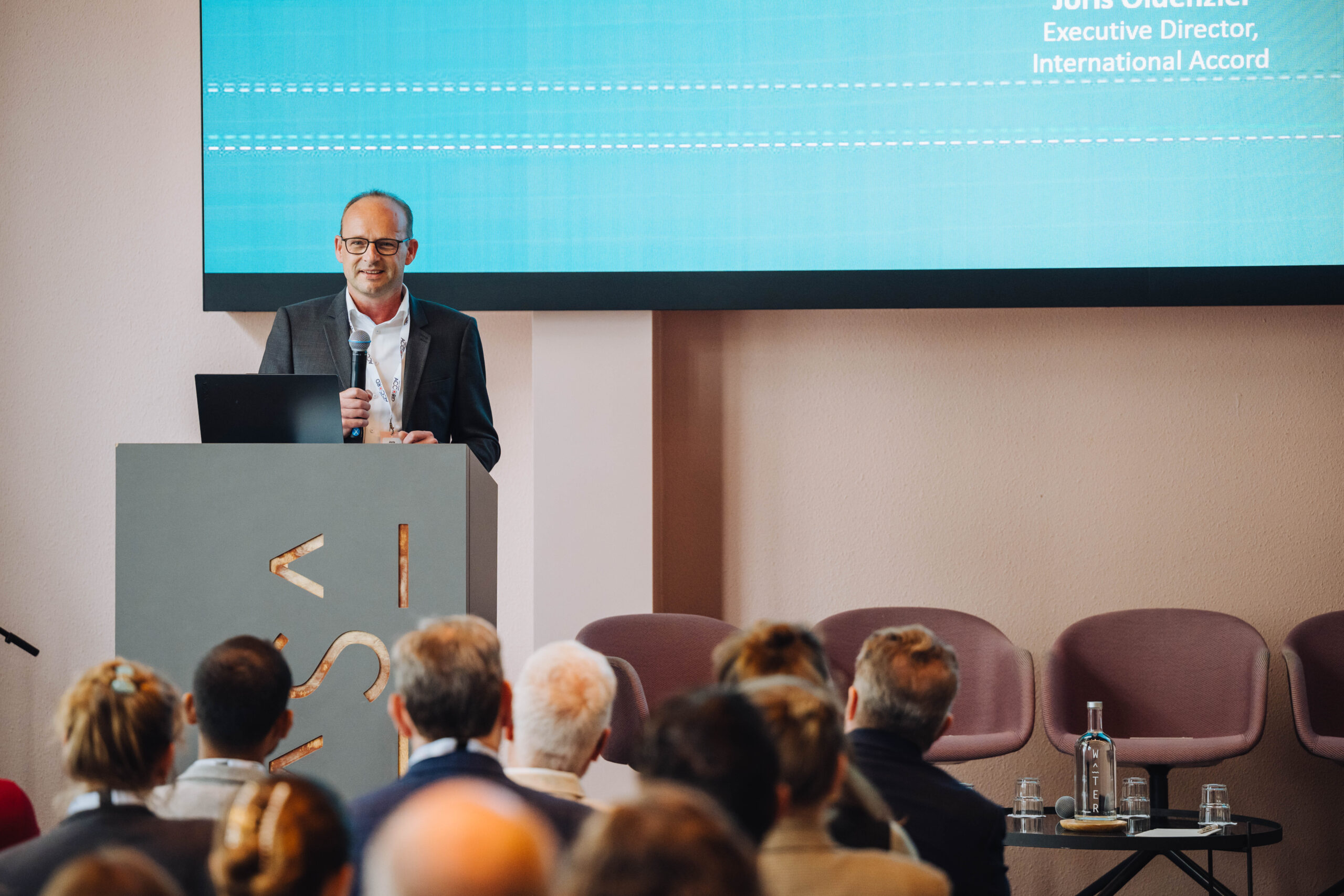
Updates on the Pakistan Accord
Zulfiqar Shah, Country Director of the Pakistan Accord, and Paul Rigby, Chief Safety Officer (CSO), shared insights on the Pakistan Accord’s implementation. They outlined the growing coverage of signatories, factories, and workers under the country program. Shah highlighted the encouraging reception from factories for the worker safety training sessions, as well as the positive feedback received on the government capacity-building program.
Rigby provided detailed updates on the factory remediation work underway in Pakistan, including the fire, electrical and structural safety issues at covered factories since the start of inspections in October 2023. He noted overstressed structural columns and a lack of access to safe egress for workers as common safety issues requiring remediation.
He further highlighted the ongoing knowledge exchange and collaboration between the engineers from the Pakistan and Bangladesh teams.
Rigby underscored the importance of engagement between brands, retailers and suppliers. He urged brands and retailers to be closely involved in the inspection and remediation process, stressing that proactive collaboration enables more effective risk identification, accelerates remediation timelines, and fosters stronger relationships with factories.
Updates on the Bangladesh Safety Agreement
Abdul Haque, Managing Director of RSC, along with Shah Sefat Uddin Ahmed, Senior Head of the Remediation Program, and MD Hassan Nawazis, Chief Safety Officer (CSO), shared updates and insights into the ongoing health and safety efforts under the Bangladesh Safety Agreement.
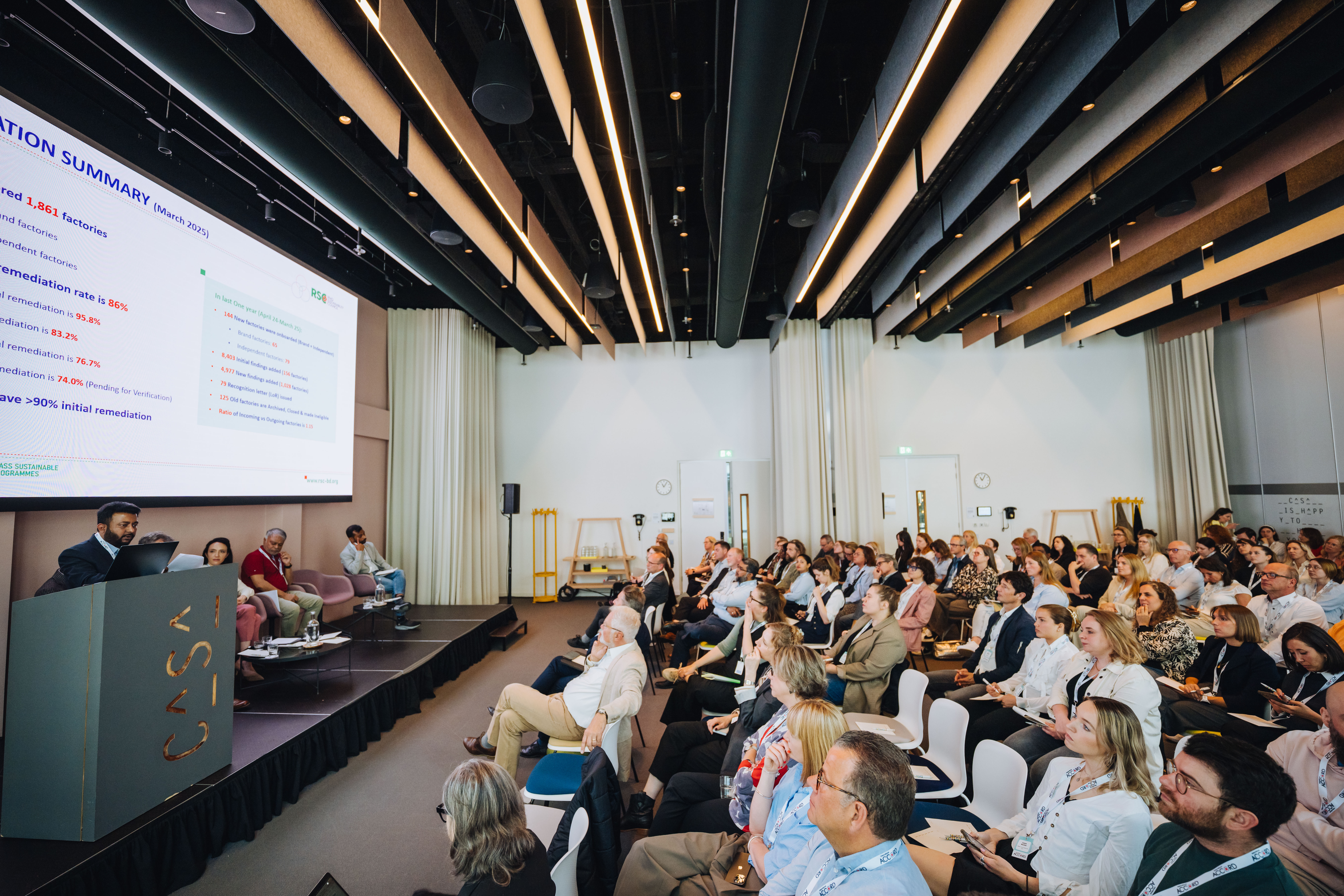
The team outlined several key measures aimed at strengthening remediation efforts at covered factories in Bangladesh. These include:
- Capacity-building workshops for factories and service providers
- Clear communication of remediation requirements following inspections
- Introduction of Stage 1 meetings to address non-compliances promptly
Updates included progress on inspection scopes at covered factories and the expansion of the Occupational Safety and Health (OSH) Complaints Mechanism, and the planned digitalisation to streamline organisational processes.
Perspectives on the Complaints Mechanism
Kirstine Drew, Chief Complaints Officer for the Pakistan Accord, and Ovijit Mutsuddi, Head of the Occupational Safety and Health (OSH) Complaints Mechanism Department at the RSC, presented comparative insights from Bangladesh and Pakistan on the Accord’s Complaints Mechanism.
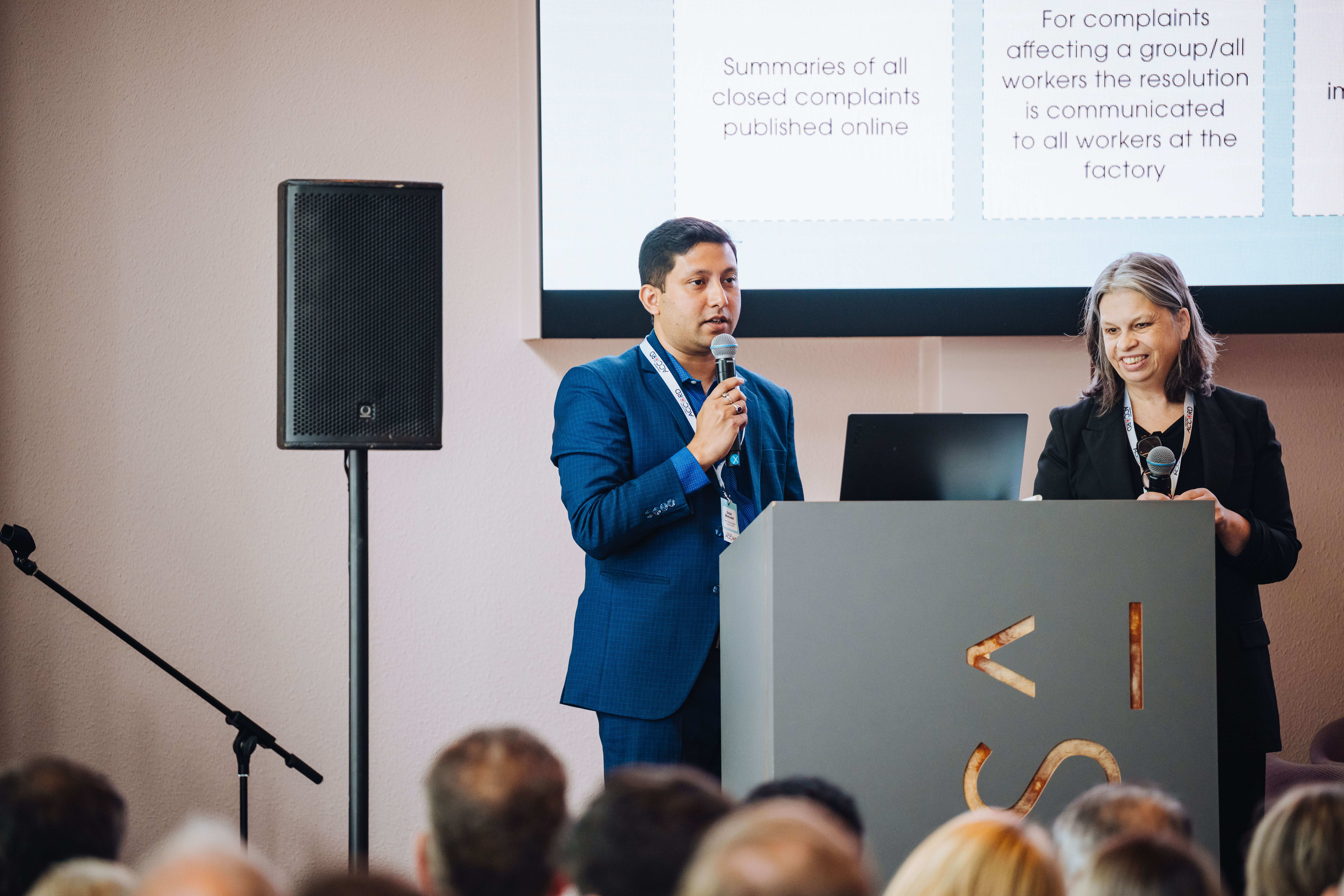
- Drew and Mutsuddi emphasised the core principles that define the Accord’s Complaints Mechanism—accessibility, legitimacy, confidentiality, enforceability and transparency. They also emphasised the dual role of a complaints mechanism – providing access to remedy for workers as well as information that brands and retailers can use to identify and prevent adverse impacts as part of their HRDD. They provided perspectives on both roles.
- They discussed the nature of complaints received and highlighted the differences between Bangladesh’s more mature system and the relatively nascent system in Pakistan. They also provided a breakdown of OSH versus non-OSH complaints, noting that the Accord’s Mechanism currently covers OSH-related issues.
- Mutsuddi shared data and analysis from Bangladesh. Common OSH-related complaints include maternity rights violations, workplace violence, sickness, and forced overtime. While non-OSH complains often involve issues such as wages, benefits and leave entitlements, and unfair terminations.
- Drew offered early-stage observations from the Pakistan Accord, describing a nascent system, with a smaller data set and a more dynamic and fluctuating distribution of complaints. OSH-related issues in Pakistan include forced overtime, workplace injuries, lack of drinking water, and insufficient personal protective equipment (PPE). Non-OSH complaints typically involve non-payment of wages and overtime, especially for contract workers.
A dynamic Q&A session followed, featuring insights from Lena Peleikis, Head of Human Rights & Responsible Supply Chain at the Otto Group, and Christina Hajagos-Clausen, Director of the Textile and Garment Industry at IndustriALL. They discussed the strategic role brands and trade unions can play in strengthening the Mechanism.
The session explored the potential for expanding the scope of the Complaints Mechanism beyond OSH. It also provided suggestions on how brands and retailers can more effectively collaborate in using the data from the Accord Complaints Mechanism for identifying risks and preventing adverse impacts, including by using the structures of the Accord.
Rotating Breakout Sessions
Following the lunch break, smaller participant groups engaged in three rotating breakout sessions:
- Launch of the Accord Signatory Portal: Led by Adelia Arista (Data Analysis & Systems Coordinator) and Colm Quinn (Head of Operations), this session introduced the new internal portal designed for Pakistan Accord signatories as part of the Accord’s broader digital transition. Arista demonstrated key functionalities of the portal and explained how it streamlines access to information about factory progress in Pakistan for signatories.
- Factory Disclosure under the Accord: Facilitated by Koen Oosterom (Head of Signatory Engagement), this session focused on the factory disclosure process under the Accord. Oosterom outlined the requirements and process for signatories to list factories under the Accord, emphasising its central role in ensuring supply chain transparency and accountability.
- External Session by ILO: Employment Injury Scheme Pilot in Bangladesh: Hosted by Dr. Anne Marie La Rosa (ILO), this session explored ILO’s Employment Injury Scheme Pilot in Bangladesh. Dr. La Rosa presented the business case for responsible supply chains, highlighting how the pilot supports worker protections and improves supply chain monitoring for brands.
Accord Expansion, Pakistan Accord Renewal and Brand Caucus
Following the breakout sessions, Oldenziel presented insights into the expansion of the Accord to other countries. The session provided an opportunity for signatories to discuss their interest in expanding the Accord’s work, informed by key findings from a brand survey conducted in March 2025.
The survey results included details on major sourcing countries, the types of supplier facilities involved and priority countries for potential expansion.
In recognition of the need for continued work in Pakistan, brands and trade unions engaged in a discussion around the upcoming negotiations and renewal of the Pakistan Accord. The session focused on the key considerations necessary to ensure the continuity and further strengthening of the Accord’s commitments in Pakistan.
On 22 May, Accord signatory brands convened a Brand Caucus to discuss important topics among peers. Discussions covered the renewal of the Pakistan Accord, the potential expansion of the Complaints Mechanism to address non-OSH grievances, and the Accord’s expansion to other countries.
We extend our sincere thanks to all attendees for their openness, insights, and recommendations, which are critical to effectively implementing the Accord’s programs and contributing to a safer and more responsible garment and textile industry. We also thank our moderator, Olivia Windham Stewart, and the Hotel Casa team for their invaluable organisational support in making this event possible.
For more information, contact:
- media@internationalaccord.org
- Mini Dixit, Communications Advisor: mini.dixit@internationalaccord.org
Related updates
October 16, 2025
Safe exits, unlocked gates, functioning alarms, effective fire separation, and strong emergency preparedness are essential for the health and safety of every worker, within and beyond the garment industry.
August 11, 2025
This briefing provides updates on the number of signatory brands and covered factories, the rollout of Workplace Programs, and recent events organised by the Pakistan Accord team.
May 28, 2025
The International Accord’s All Signatory Meeting was dedicated to insights on the progress and operations of the Accord’s country program in Bangladesh and Pakistan, alongside exploring opportunities to expand the Accord’s scope and impact.
October 16, 2025
Safe exits, unlocked gates, functioning alarms, effective fire separation, and strong emergency preparedness are essential for the health and safety of every worker, within and beyond the garment industry.
May 28, 2025
The International Accord’s All Signatory Meeting was dedicated to insights on the progress and operations of the Accord’s country program in Bangladesh and Pakistan, alongside exploring opportunities to expand the Accord’s scope and impact.
February 19, 2025
The Pakistan Accord team recently organised a series of capacity building workshops for government officials in the Sindh and Punjab provinces.
Capacity Building Workshops for Government Officials in Sindh and Punjab
Updates
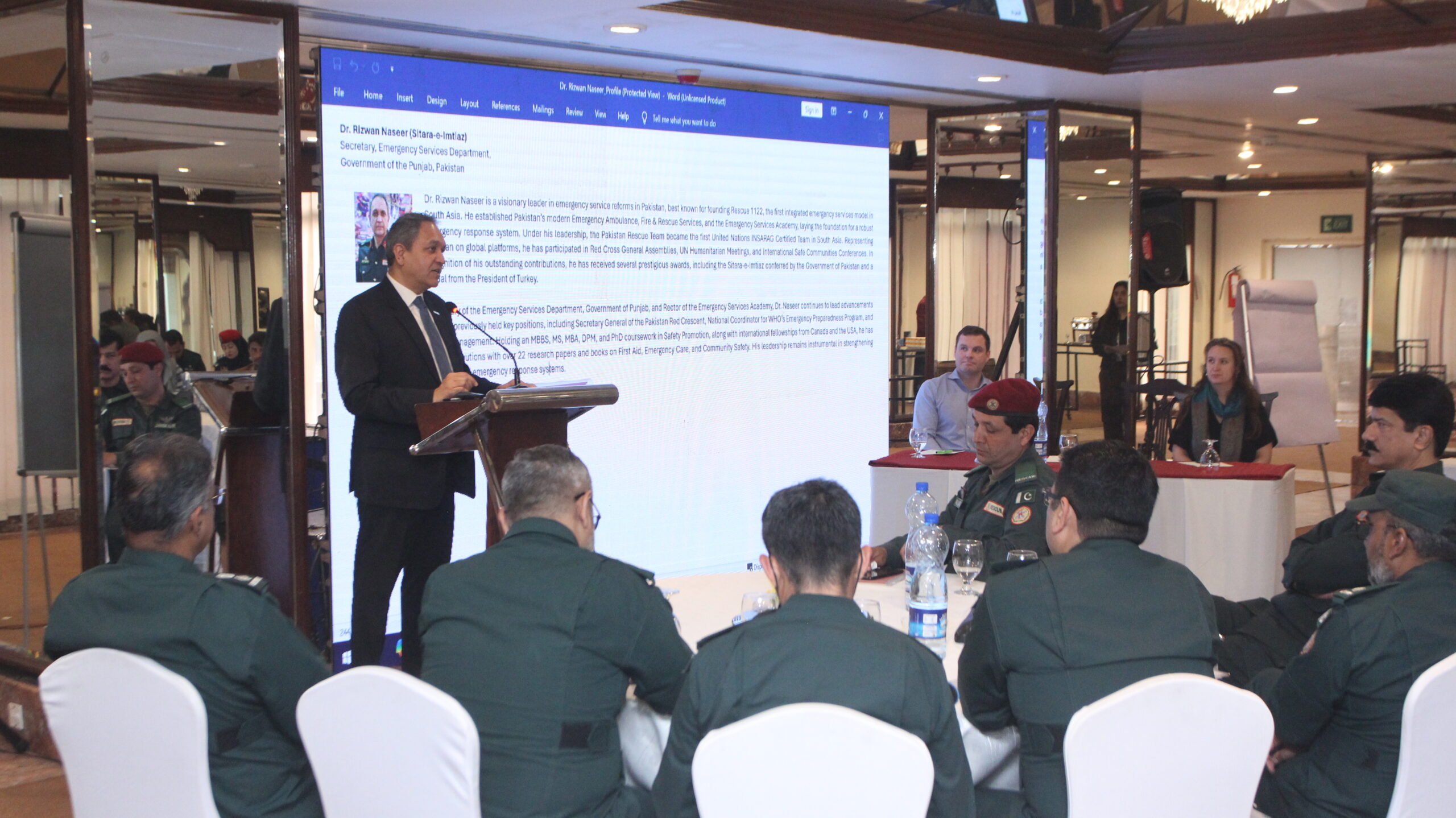
The Pakistan Accord team recently organised a series of capacity building workshops for government officials in the Sindh and Punjab provinces.
The first workshop took place in Karachi from 3 to 7 February, 2025, and was attended by over 70 participants representing eight government departments. These included the Sindh Building Control Authority, Department of Labour and Human Resources, Sindh Emergency Service Department, Civil Defense, K Electric, Fire Brigade Department, and NED University of Engineering and Technology.
The second workshop, held in Lahore from 10 to 14 February, 2025, was also attended by an equal number of participants representing seven departments, including Lahore Development Authority, Faisalabad Development Authority, Department of Labour and Human Resources, Rescue 1122, Civil Defense, UET, NESPAK, and LESCO.
The workshop modules delivered by expert engineers from Arup, included technical and non-technical aspects of building safety, fire safety, and electrical safety, along with an overview of the approval process and regulatory mechanisms in existence in Pakistan. Participants were also exposed to international standards and requirements in the field.
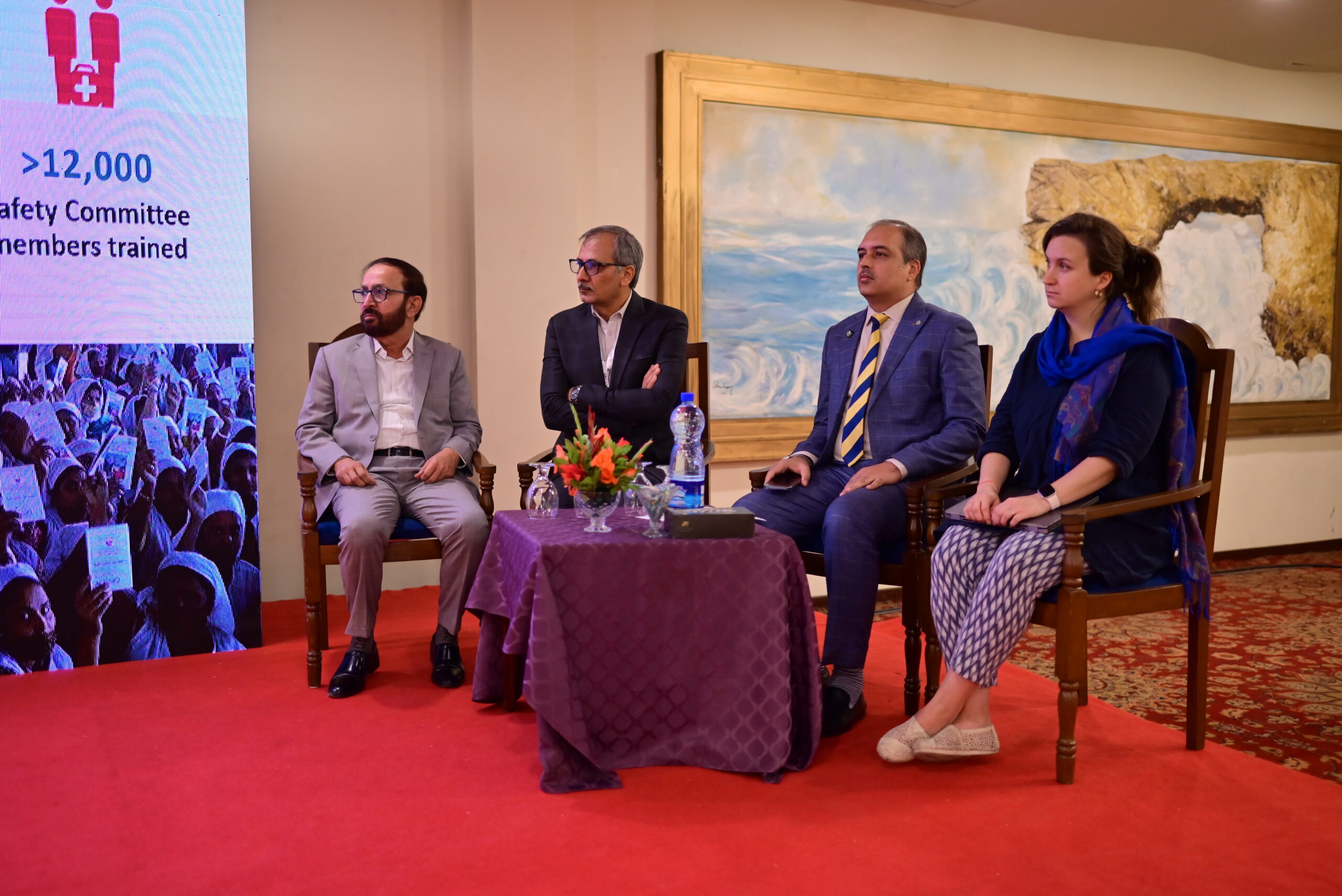
The five-day workshops also provided an opportunity for participants from these departments to engage in mutual learning and sharing, in addition to networking and socialising. The factory visits arranged for a limited number of participants also generated great interest among attendees, along with on-site explanations of various aspects of building safety.
The workshop in Karachi was jointly inaugurated by Dr. Abid Shaikh, Director General of Sindh Emergency Services, and Mr. Athar Ali Shah, Joint Director of the Department of Labour and Human Resources.
In Lahore, Dr. Rizwan Naseer, DG of Rescue 1122, was the Chief Guest at the inaugural session, while Syeda Kulsoom Hayee, DG of Labour Welfare, was the Chief uest at the closing ceremony and distributed certificates among the participants.
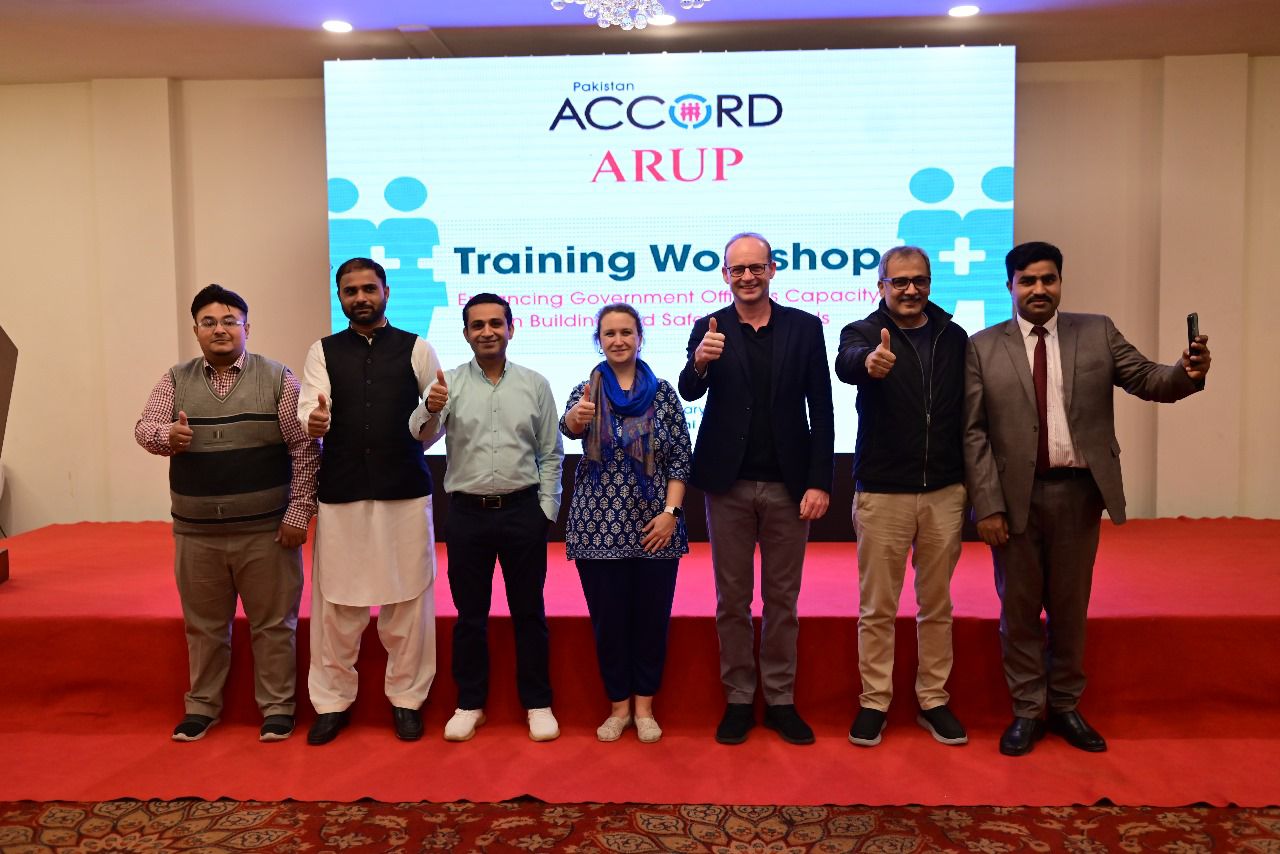
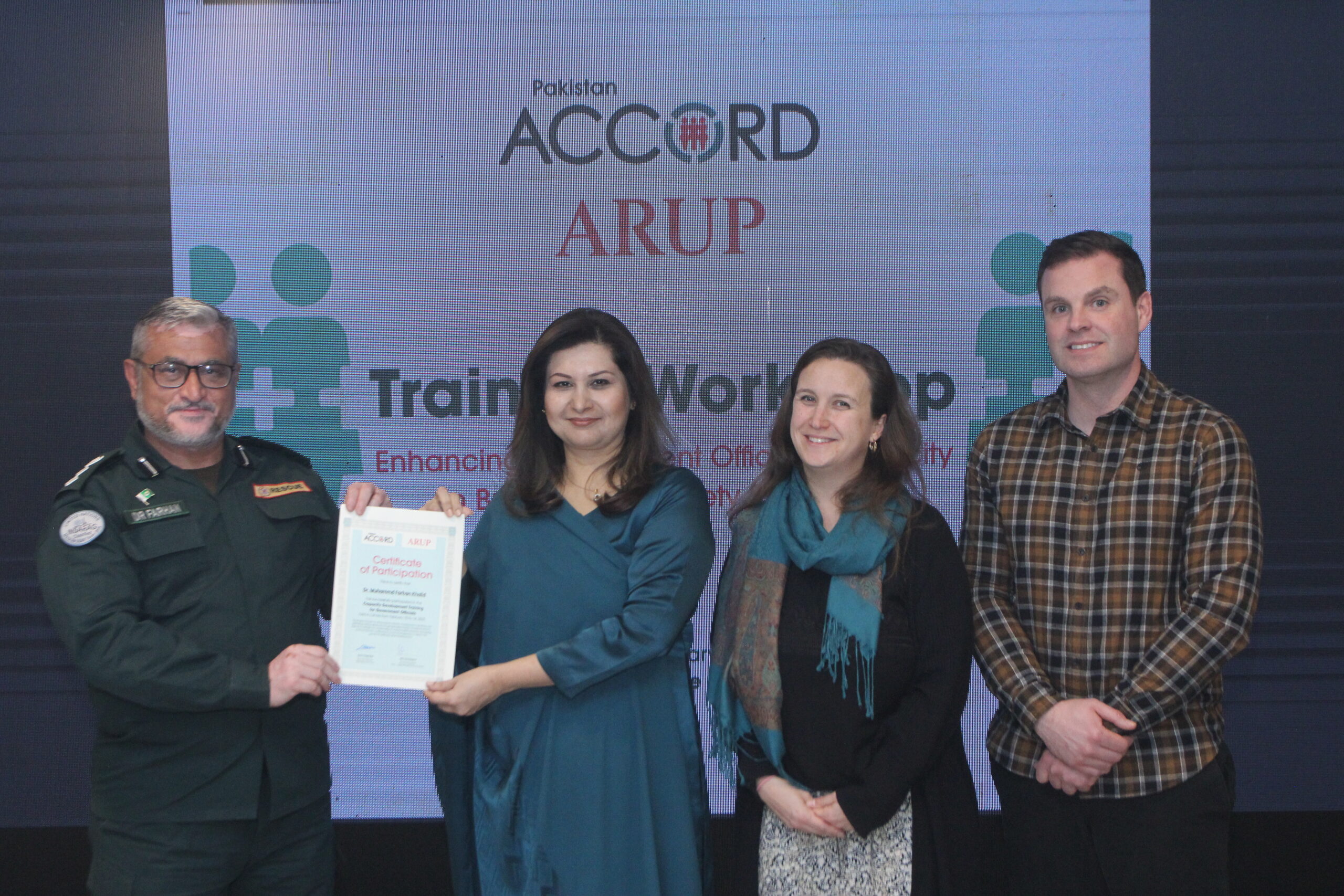
In addition to key trainers Ms. Vita Sanderson, Kenneth Wynne, and Mr. Will from Arup, Mr. Joris Oldenziel, Executive Director of International Accord, Mr. Colm Quinn, Interim Chief Safety Officer, and Mr. Zulfiqar Shah, Country Director of Pakistan Accord, specially participated in the training program.
The Pakistan Accord hopes to contribute to enhancing the capacity of relevant government departments, fostering a stronger safety culture across all workplaces in Pakistan.
Resources:
Related updates
October 16, 2025
Safe exits, unlocked gates, functioning alarms, effective fire separation, and strong emergency preparedness are essential for the health and safety of every worker, within and beyond the garment industry.
August 11, 2025
This briefing provides updates on the number of signatory brands and covered factories, the rollout of Workplace Programs, and recent events organised by the Pakistan Accord team.
May 28, 2025
The International Accord’s All Signatory Meeting was dedicated to insights on the progress and operations of the Accord’s country program in Bangladesh and Pakistan, alongside exploring opportunities to expand the Accord’s scope and impact.
October 16, 2025
Safe exits, unlocked gates, functioning alarms, effective fire separation, and strong emergency preparedness are essential for the health and safety of every worker, within and beyond the garment industry.
May 28, 2025
The International Accord’s All Signatory Meeting was dedicated to insights on the progress and operations of the Accord’s country program in Bangladesh and Pakistan, alongside exploring opportunities to expand the Accord’s scope and impact.
February 19, 2025
The Pakistan Accord team recently organised a series of capacity building workshops for government officials in the Sindh and Punjab provinces.
Pakistan Accord Holds its first All Employee Meeting in Pakistan
Updates
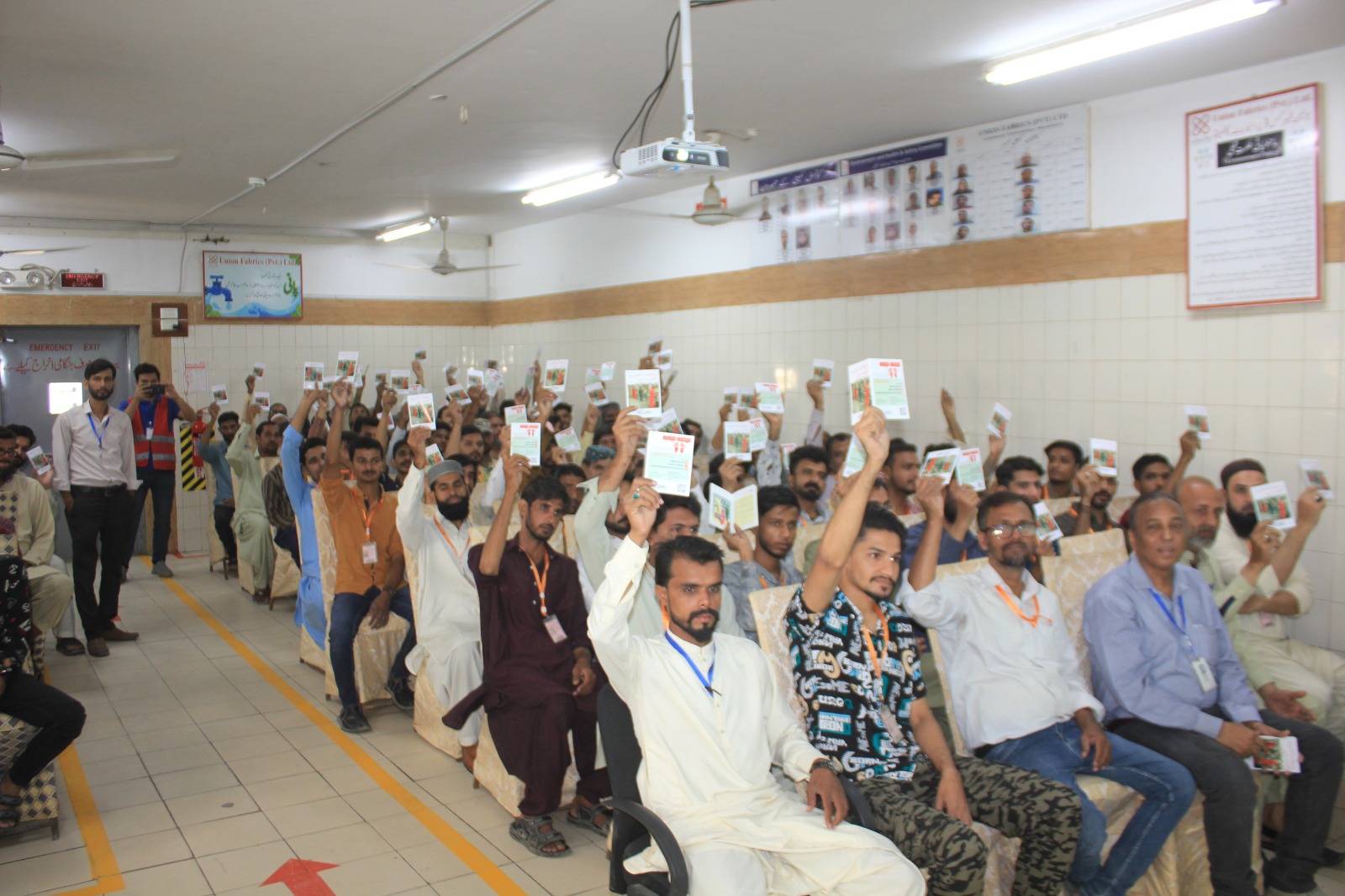
On 26 and 27 November 2024 the Pakistan Accord conducted its inaugural safety training meeting in Pakistan at Union Fabrics (Pvt.) Limited, a home textile manufacturing facility located in Karachi. The meeting was attended by all employees of the factory.
Opening remarks
During the opening remarks of the kick-off training session, Kirstine Drew, Chief Complaints Officer at Accord Pakistan, first provided an overview of the Pakistan Accord program in Pakistan.
Zulfiqar Shah, Country Manager of Pakistan Accord, later addressed the attendees, underlining the importance of the Safety Training Program.
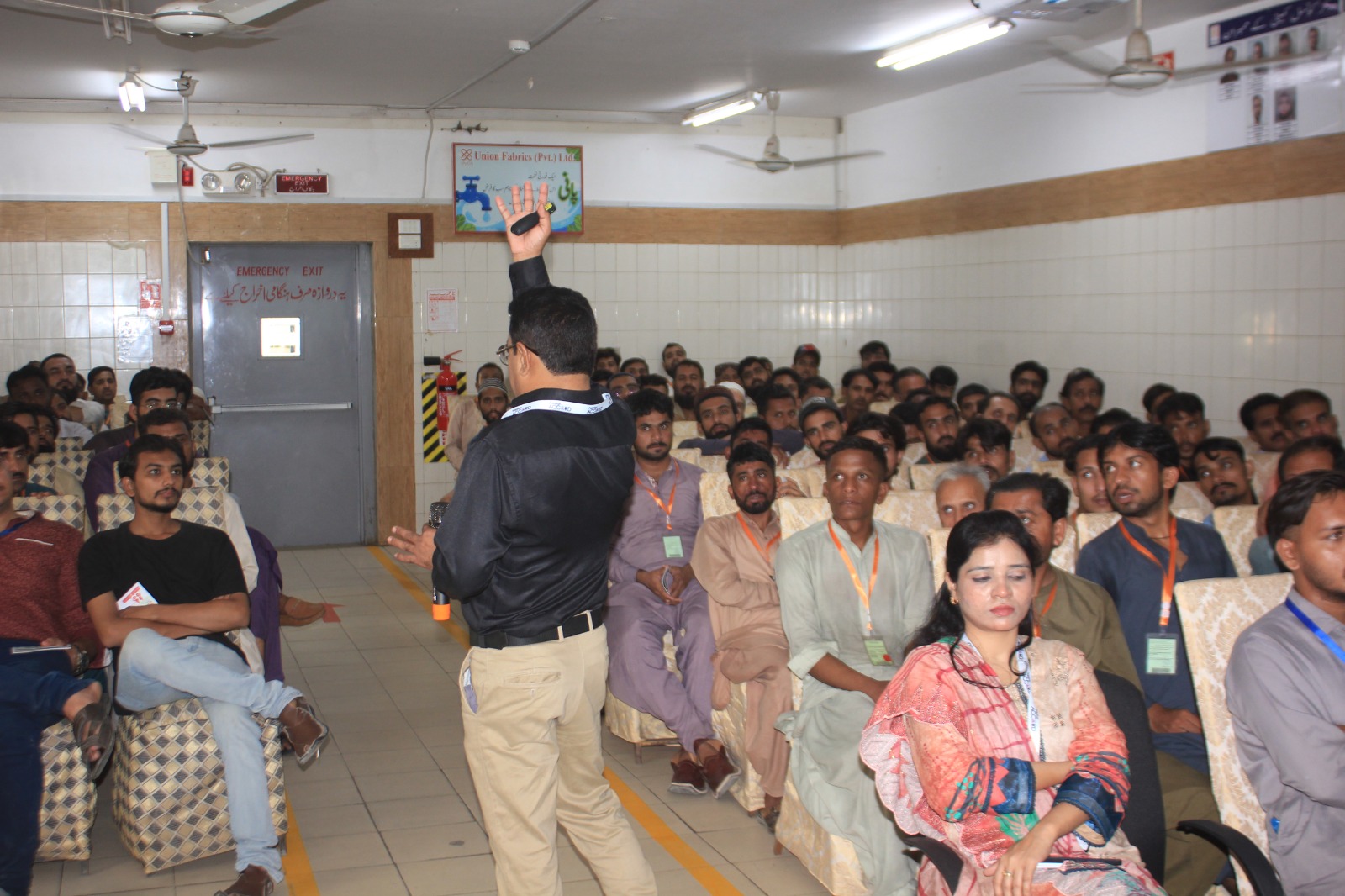
Training sessions
The topic of the training was ‘Rights and Responsibilities under the Pakistan Accord and Introduction to the Safety Committee’. During the training, Safety Committee members were introduced to the participants and given the opportunity to explain their roles and responsibilities for safety and health within the factory.
Six sessions were held over two days, with active participation from the workers. The sessions were led by three members of the Pakistan Accord Training team: Mr. Numair Aman, Mr. Abdul Qadir and Mr. Murtuza Ahmed.
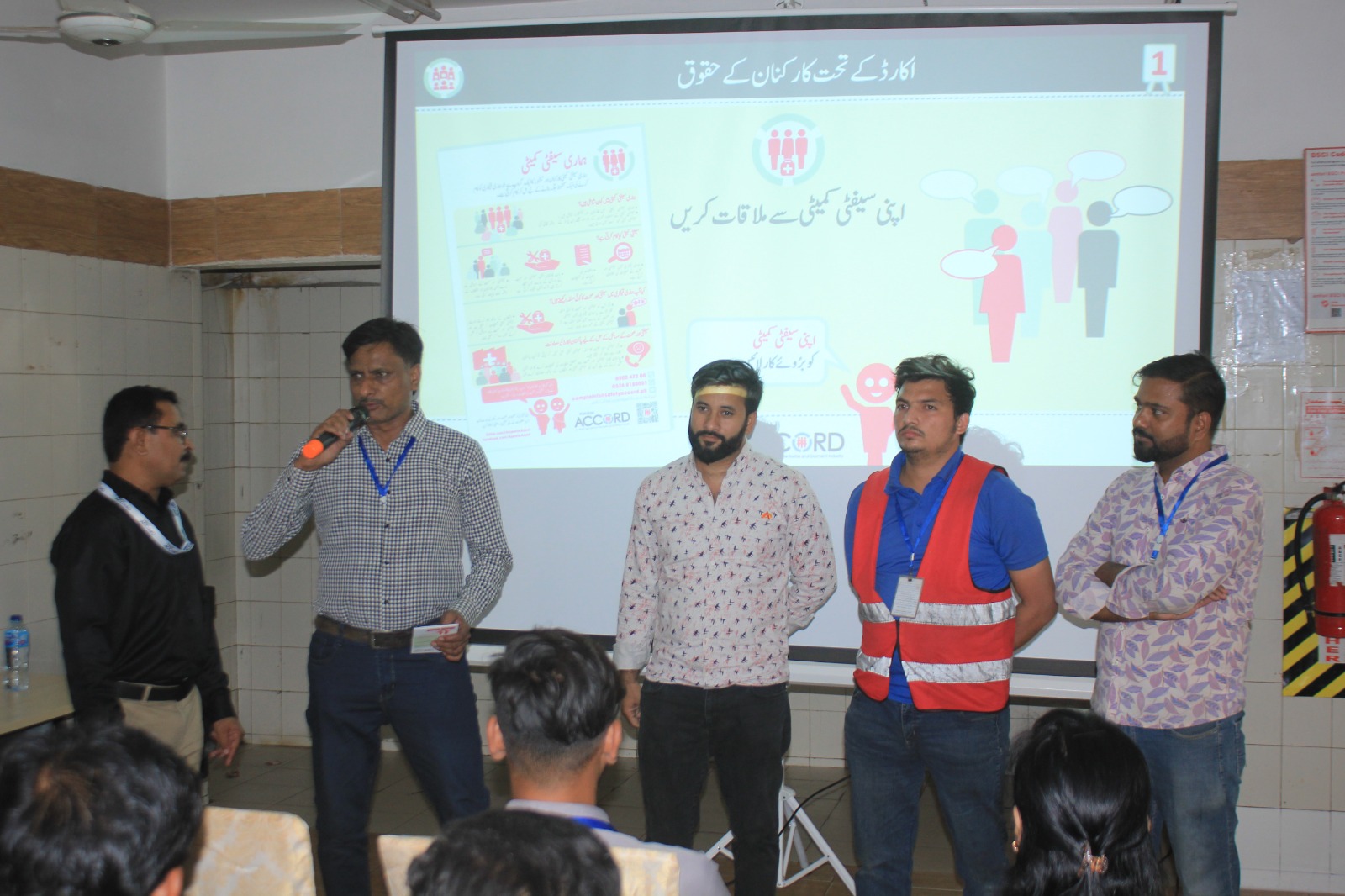
All participants were provided with a booklet on the rights and responsibilities of workers under the Pakistan Accord. Posters and large Panaflex banners describing the role of the Safety Committee and providing contact information for the Pakistan Accord were posted in strategic locations throughout the facility, including the worker canteen, main gate, and assembly points.
The sessions were conducted in Urdu and all accompanying materials printed in Urdu.
The Pakistan Accord extends its gratitude to the management of Union Fabrics for its support in facilitating the first Pakistan Accord All Employee Meeting in Pakistan.
Resources:
Related updates
October 16, 2025
Safe exits, unlocked gates, functioning alarms, effective fire separation, and strong emergency preparedness are essential for the health and safety of every worker, within and beyond the garment industry.
August 11, 2025
This briefing provides updates on the number of signatory brands and covered factories, the rollout of Workplace Programs, and recent events organised by the Pakistan Accord team.
May 28, 2025
The International Accord’s All Signatory Meeting was dedicated to insights on the progress and operations of the Accord’s country program in Bangladesh and Pakistan, alongside exploring opportunities to expand the Accord’s scope and impact.
October 16, 2025
Safe exits, unlocked gates, functioning alarms, effective fire separation, and strong emergency preparedness are essential for the health and safety of every worker, within and beyond the garment industry.
May 28, 2025
The International Accord’s All Signatory Meeting was dedicated to insights on the progress and operations of the Accord’s country program in Bangladesh and Pakistan, alongside exploring opportunities to expand the Accord’s scope and impact.
February 19, 2025
The Pakistan Accord team recently organised a series of capacity building workshops for government officials in the Sindh and Punjab provinces.
Rollout of Pakistan Accord Workplace Programs
Updates

The Pakistan Accord Secretariat hosted a briefing on the rollout of Workplace Programs on August 19, 2024, in Karachi. Over 70 participants representing 30 covered factories attended the orientation session. The International Labour Organisation (ILO) and Deutsche Gesellschaft für Internationale Zusammenarbeit (GIZ) also attended the session as special invitees.
The event featured a panel discussion and a detailed briefing, providing participants with an opportunity to ask questions and provide feedback.
The Workplace Program, which includes Safety Training and a Complaints Mechanism at covered factories, is a key component of the Pakistan Accord. It aims to help build the capacity of joint labour management Safety Committees to maintain safe workplaces, raise workers’ awareness of safety and health, ensure compliance with OSH-related requirements, and provide workers with access to remedies.
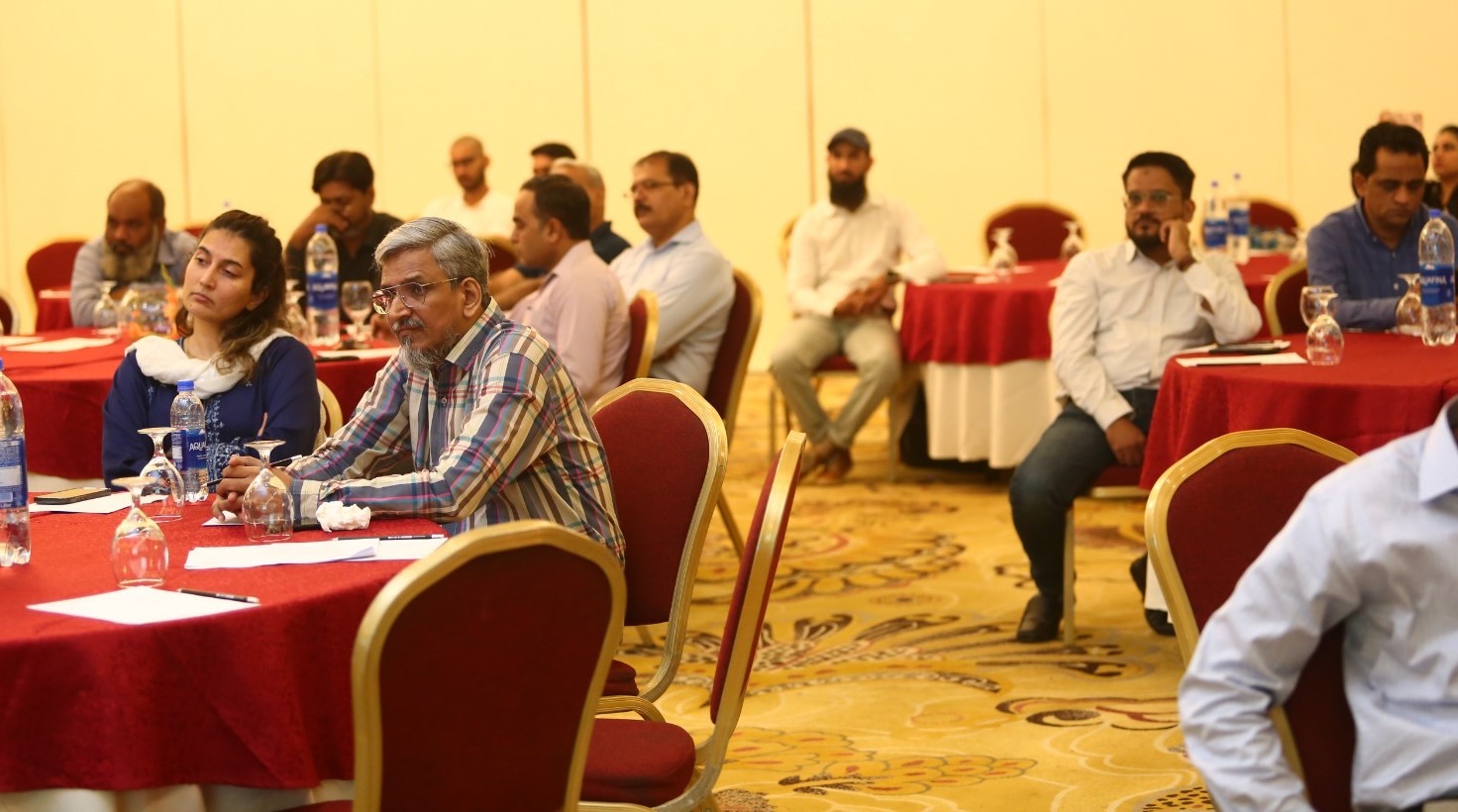
Zulfiqar Shah, Country Manager of the Pakistan Accord, highlighted the importance of workplace safety in his opening remarks. He also expressed appreciation for the cooperation extended by key stakeholders, particularly the factories.
He provided an update to the participants, stating that the Pakistan Accord on Health and Safety in the Textile and Garment Industry, a legally binding agreement between global brands and unions, took effect in January 2023. To date,128 brands that collectively source over $3 billion worth of goods from 500 factories in Pakistan’s Sindh and Punjab provinces have signed the agreement. The program aims to reach over 500,000 workers through its safety training program and has conducted safety inspections in over 80 factories.
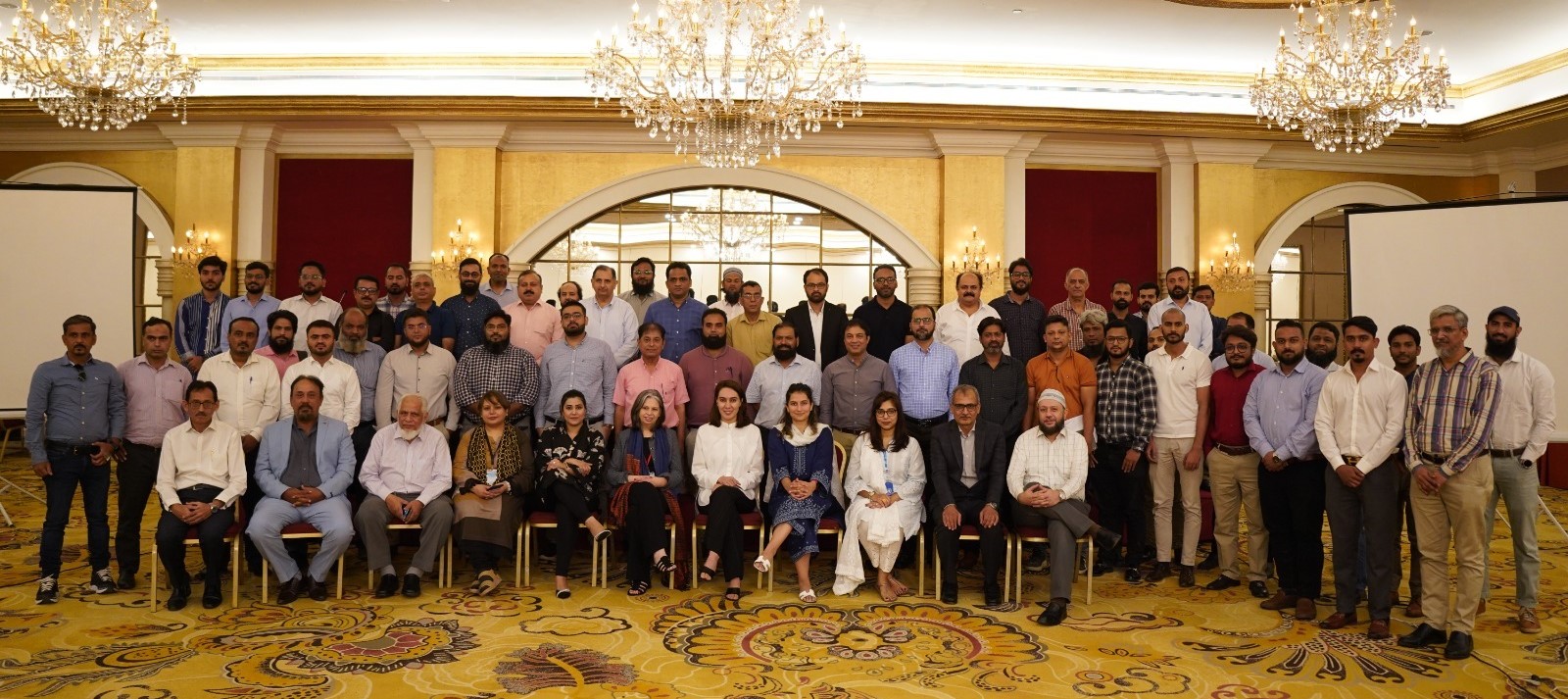
Kirstine Drew, Chief Complaints Officer, Pakistan Accord explained in her presentation that the right to refuse unsafe work, provision of safety training programs, joint labour management Safety Committees, and the Complaints Mechanism are the cornerstones of worker participation in the Accord program.
The Pakistan Accord Safety Training program is made up of two parts: All Employee Meetings (AEMs), which are informational sessions attended by all workers of the factory, covering topics such as evacuation, health and safety risks, and workers’ rights and responsibilities regarding workplace safety. The second component is the Safety Committee Training Program, which includes both mandatory and optional modules. These modules cover various issues, including the role of Safety Committees in handling workers’ complaints and the organisation of factory walkthroughs.
The complaints mechanism is implemented on behalf of signatory brands and in accordance with UN effectiveness criteria – legitimate, accessible, predictable, equitable, transparent, rights-compatible – as well as the requirements of due diligence legislation. The Accord team works with factory management and brands to address complaints and ensure the delivery of remedies.
Workers at covered factories can submit complaints via the following channels:
WhatsApp: +92 326 8180001 Local No: 0326 8180001 Email: complaints@safetyaccord.pk
In the panel discussion, Rehan Ahmedani, representing Synergies Sourcing, and Neelofar Saleem, representing Bestseller, emphasised that having an independent complaints mechanism in place is now a legal requirement for brands under various legislations in Europe, such as the German Supply Chain Act and the EU Corporate Sustainability Due Diligence Directive (CSDDD).
Both speakers noted that receiving complaints is not necessarily ‘bad’, and they prefer to work with suppliers who have efficient and effective systems to address them.
They also encouraged supplier factories to embrace the Safety Training Program as an opportunity to strengthen workplace safety and health and contribute to learning.
During the Q&A session, participating factories highlighted the challenges they face due to the presence of multiple complaints mechanisms within their facilities, expressing concern that having various grievance mechanisms in the same location confuses workers.
The event concluded with a collective commitment to work together to make workplaces safer for factory workers. The Pakistan Accord Secretariat is planning to organise similar informational sessions with additional covered factories in Lahore and Karachi.
Resources:
Related updates
October 16, 2025
Safe exits, unlocked gates, functioning alarms, effective fire separation, and strong emergency preparedness are essential for the health and safety of every worker, within and beyond the garment industry.
August 11, 2025
This briefing provides updates on the number of signatory brands and covered factories, the rollout of Workplace Programs, and recent events organised by the Pakistan Accord team.
May 28, 2025
The International Accord’s All Signatory Meeting was dedicated to insights on the progress and operations of the Accord’s country program in Bangladesh and Pakistan, alongside exploring opportunities to expand the Accord’s scope and impact.
October 16, 2025
Safe exits, unlocked gates, functioning alarms, effective fire separation, and strong emergency preparedness are essential for the health and safety of every worker, within and beyond the garment industry.
May 28, 2025
The International Accord’s All Signatory Meeting was dedicated to insights on the progress and operations of the Accord’s country program in Bangladesh and Pakistan, alongside exploring opportunities to expand the Accord’s scope and impact.
February 19, 2025
The Pakistan Accord team recently organised a series of capacity building workshops for government officials in the Sindh and Punjab provinces.
International Accord Statement on the Political Situation in Bangladesh
Updates

Statement
Amsterdam, 8 August 2024:
In view of the complex political situation in Bangladesh, the International Accord makes the following statement in solidarity with the people of Bangladesh.
The International Accord is deeply concerned about the breakdown in law and order and the ensuing violence in Bangladesh and its impact on the two million workers in Accord-covered factories and our partners in the RMG industry.
It is not possible at this stage to assess the impact current events will have on the RMG industry given the rapidly changing situation. In these uncertain times, the International Accord calls on all signatories of the Bangladesh Safety Agreement[1] to stand by their Bangladeshi industry partners with patience in order to support the economic future of the country.
We urge all signatories to:
- Uphold the letter and the spirit of the commitments made to maintain a long-term sourcing relationship with Bangladesh.
- Actively engage with your suppliers to work together and address challenges related to production targets, order deliveries and the safety and health of workers.
- Continue supporting the RMG Sustainability Council (RSC) throughout this challenging period.
In addition, we have also learnt of, as yet unverified, reports of vandalism and fires at some RMG factories in Bangladesh. Any safety incidents at covered factories will be investigated by the RSC in accordance with their operating procedures, to the extent possible under the circumstances.
The International Accord will work to the best of its ability, together with colleagues from the RSC, Accord brands, trade unions, witness signatories and industry, to provide ongoing support and ensure that commitments made on safety and health protections are upheld. These include upholding the right to refuse unsafe work, maintaining regular income during any period a factory is closed for safety reasons, and avoiding excessive working hours to make up for production delays.
The International Accord hopes that Bangladesh quickly returns to a state of political and social stability and that we can continue our collective journey towards a safe and sustainable RMG industry in Bangladesh.
Our thoughts and prayers are with the people of Bangladesh.
[1] The Bangladesh Safety Agreement is a Country-Specific Safety Program that is an addendum to the International Accord framework agreement and has been signed by 201 garment brands and retailers.
END
For more information, contact:
- media@internationalaccord.org
- Mini Dixit, Communications Advisor: mini.dixit@internationalaccord.org
Related updates
October 16, 2025
Safe exits, unlocked gates, functioning alarms, effective fire separation, and strong emergency preparedness are essential for the health and safety of every worker, within and beyond the garment industry.
August 11, 2025
This briefing provides updates on the number of signatory brands and covered factories, the rollout of Workplace Programs, and recent events organised by the Pakistan Accord team.
May 28, 2025
The International Accord’s All Signatory Meeting was dedicated to insights on the progress and operations of the Accord’s country program in Bangladesh and Pakistan, alongside exploring opportunities to expand the Accord’s scope and impact.
October 16, 2025
Safe exits, unlocked gates, functioning alarms, effective fire separation, and strong emergency preparedness are essential for the health and safety of every worker, within and beyond the garment industry.
May 28, 2025
The International Accord’s All Signatory Meeting was dedicated to insights on the progress and operations of the Accord’s country program in Bangladesh and Pakistan, alongside exploring opportunities to expand the Accord’s scope and impact.
February 19, 2025
The Pakistan Accord team recently organised a series of capacity building workshops for government officials in the Sindh and Punjab provinces.
Day 2 Recap: Accord All Signatory Meeting 2024
Updates

The International Accord held its All Signatory Meeting 2024 on the 25 and 26 of April 2024 at the Rode Hoed in Amsterdam, the Netherlands. The purpose of the event was to update participants about the key developments on the operations and implementation of the Accord’s Country-Specific Safety Programs (CSSPs) in Bangladesh and Pakistan.
26 April marked the second day of the International Accord‘s All Signatory Meeting highlighted the Pakistan Accord and welcomed the participation of over 30 suppliers from the Pakistani textile and garment industry.
The event brought together global brands and retailers including Adidas, Mango, Primark, Lidl, Matalan, PVH, Puma, Zalando, Kik Textilien, GAP Inc, ASOS, AEO Inc. H&M, Inditex and Bestseller.
Participation from the Pakistani textile and garment industry included nearly 30 representatives. Additionally, this day saw representation from the International Apparel Federation (IAF).
The day began with opening remarks from Michelle Tarry of American Eagle Outfitters Inc (AEO) emphasising the key role of the Accord’s remediation plans and worker training in promoting and maintaining workplace safety at their sourcing facilities. Tarry further underscored AEO’s commitment to the Pakistan Accord, stating:
We are in a position to extend the achievements from Bangladesh to Pakistan. While our production in Pakistan has been limited thus far; our recent visits have left us impressed with the industry’s investments in safety infrastructure, sustainability, and innovation. In the coming years, we see significant growth potential in Pakistan and remain committed to the well-being of those making our products. The Pakistan Accord’s inspection program, training initiatives, and complaints mechanism will be instrumental in this journey.
Koen Oosterom and Zulfiqar Shah, offered updates on the operations of the Pakistan Accord, followed by a discussion on the inspections and remediation programs by the Accord’s George Faller, Colm Quinn, and Veronique Camerer who elaborated on the importance of planning factory remediation and the available tools to ensure that it is financially feasible for factories to correct safety risks.
The session concluded with insights from Zubaida Machiyara (Fashion Knit Industries) and Yasir Yaqoob (Lucky Textile Mills), who shared their experiences of participating in the initial inspections under the Pakistan Accord.
The panel on the Accord’s workplace programs featured observations by David Reiner (Zalando), Matthijs Crietee (IAF: International Apparel Federation), Christina Hajagos-Clausen (IndustriALL Global Union ), and Kirstine Drew (Pakistan Accord) who echoed the importance of collaboration among all actors in ensuring access to remedy through the Accord’s complaints mechanism.
The last session featured valuable recommendations from suppliers to implement the Pakistan Accord. Key suggestions emphasised prioritising transparency, facilitating knowledge exchange, nurturing business stability, and embracing collaborative models tailored to accommodate facilities of all sizes.
Muhammed Rehan Ahmendani (Executive Director, Synergies Worldwide) shared:
“The arrival of the Accord in Pakistan is not a challenge but an opportunity. It is logical to understand that a safer workforce means more brands and, consequently, more business. The Accord is skillful and focuses on fostering strong business relations between brands and suppliers. Moving forward, I recommend that brands remain committed to the program and embrace new ideas to ensure worker safety, with a special focus on digitisation.”
We thank our panelists, Azfar Hasan (Matrix Sourcing), Kaschif R. Israr (Euro Centra Pakistan), Aamir Chottani (CHOTTANI INDUSTRIES.), Muhammed Rehan Ahmedani (Synergies Worldwide), Michael Bride and Veronique Camerer for their invaluable insights.
Lastly, we thank all attendees for their openness, insights, and recommendations, which are crucial to effectively implementing the Pakistan Accord and contributing to a safer garment and textile industry.
We thank our moderator, Olivia Windham Stewart and the Amerpodia team for the organisational support on this event.
For more information, contact:
- media@internationalaccord.org
- Mini Dixit, Communications Advisor: mini.dixit@internationalaccord.org
Related updates
October 16, 2025
Safe exits, unlocked gates, functioning alarms, effective fire separation, and strong emergency preparedness are essential for the health and safety of every worker, within and beyond the garment industry.
August 11, 2025
This briefing provides updates on the number of signatory brands and covered factories, the rollout of Workplace Programs, and recent events organised by the Pakistan Accord team.
May 28, 2025
The International Accord’s All Signatory Meeting was dedicated to insights on the progress and operations of the Accord’s country program in Bangladesh and Pakistan, alongside exploring opportunities to expand the Accord’s scope and impact.
October 16, 2025
Safe exits, unlocked gates, functioning alarms, effective fire separation, and strong emergency preparedness are essential for the health and safety of every worker, within and beyond the garment industry.
May 28, 2025
The International Accord’s All Signatory Meeting was dedicated to insights on the progress and operations of the Accord’s country program in Bangladesh and Pakistan, alongside exploring opportunities to expand the Accord’s scope and impact.
February 19, 2025
The Pakistan Accord team recently organised a series of capacity building workshops for government officials in the Sindh and Punjab provinces.

